#<— also check out that tag on instagram to see everyones pieces in better quality!!
Explore tagged Tumblr posts
Text










finally time to share him!!!
i yapped abt it on instagram but doing this was so much fun!!! go check out some of the artists who participated!! (all of these tags are their instagram handles :))
thank you again @stovreye for hosting this! <33
also click for better quality!! appreciate everyones pieces !!!!!
#i tried posting this before but tumblr struck me dead#duke thomas#the signal#dc signal#batfam#batfamily#dc fanart#dc comics#art collab#stovreyedcartcollab#<— also check out that tag on instagram to see everyones pieces in better quality!!#ash's doodlings
437 notes
·
View notes
Text
How To Reap The Benefits Of A Content Marketing Strategy

Content Marketing can have some incredible benefits for your business
But a lot of people still underestimate the value of Content Marketing, or indeed don’t fully understand what it is or why they should invest in bespoke content.
So let’s start by working out exactly what it is!
CONTENT MARKETING – a type of marketing that involves the creation and sharing of online material (such as videos, blogs, and social media posts) that does not explicitly promote a brand but is intended to stimulate interest in its products or services.
But I prefer Content Marketing Institute’s definition:
Content marketing is a strategic marketing approach focused on creating and distributing valuable, relevant, and consistent content to attract and retain a clearly defined audience — and, ultimately, to drive profitable customer action.
Especially the line following that definition which says “Instead of pitching your products or services, you are providing truly relevant and useful content to your prospects and customers to help them solve their issues.”
So Content Marketing is a way to talk about your products or services in a way that’s audience first and user driven. It’s less about you, and more about them – a good place to start.
What can be content?
Anything your audience can consume can be content.
Blog posts
Video & Slideshows
Graphics & Animations
Podcasts
Quizzes
Ebooks & Whitepapers
Resources & Workbooks
Playlists
Q&A or AMAs
Facebook/Instagram Live
Branded Filters & Camera Frames
And the list goes on!
The type of content you create for your Content Marketing efforts will depend completely on your audience and objectives.
Great Content Marketing can have a multitude of benefits to your business, let’s look at some of them.

Traffic & Search Results
Everyone wants more traffic to their website, or at least more qualified traffic. When you publish or host quality content on your site, people hit your site to consume it. And you know they’re more than likely interested in your product or services because that’s what your content (even if loosely) relates to.
When you offer something of value to your audience, they’ll come to you. This is the complete opposite of traditional marketing where you go to where they are and interrupt them. If you content is strong enough and valuable enough you might not even have to pay to promote it. You can publish it, and let people come to you in their own way and their own time.
Here’s a great example – Jon Loomer’s Facebook Image Dimension Guide. In case you don’t know who Jon Loomer is he’s a Facebook Ads heavy hitter who runs online training and a couple of membership clubs for exclusive content. In fact, everything Jon does is an example of excellent Content Marketing.
I read in one of his emails a while back that this page on his site is the most visited. It comes up if you Google “Facebook Image Specs” and in creating it, he knew that anyone who visited that page was looking for information on how to optimise their creative to best display on Facebook.
Whether they were marketers, or business owners, or entrepreneurs – they all had that in common. And they were coming to him. For free!
Imagine you’re in a competitive niche; all clamoring to get to the top position in a Google search, but your content – perhaps a simple “how to” video is what people are visiting? That’s YOUR brand getting ahead. Standing out without pushing people away with a hard sell.
We’ll talk more about what you can do with this traffic in a sec.
Brand Awareness & Recall
Word of mouth is still an incredibly powerful way to get your business noticed, and you’ve probably heard the phrase “word of mouse” said too. It’s so important to be known and remembered.
How can people use your services if they don’t know who you are?
How can they recommend you to their friends if they can’t remember your business name?
Create content that resonates with your audience and they’re more likely to remember you. And if they hadn’t heard of you before it’s an even better way to make them aware of your brand!
The idea is that it’s not only valuable enough for them, but sharable as well. Any time you can get people to share your content as a brand you’ve allowed them to represent you and vice versa. They’ve thought whatever you created was good enough for them to put their name to and pass along to their friends and colleagues.
And with Content Marketing you can do this without the rude interruption of more traditional types of advertising.
Brand Affinity & Loyalty
Something else you can achieve with Content Marketing is affinity from your audience, and loyalty from your current customers.
This isn’t just touchy-feely (not that there’s anything wrong with that) but in a crowded market you want people can choose your brand, over others and their affinity for what your brand stands for could be the deciding factor. But they can’t do this unless they know what your brand MEANS.
You content can explain your brand positioning, and win your audience over into fans and purchasers.
Tell your brand’s story and let your audience fall in love with you.
Then once you’ve earned their support you want to retain them!
Great content can remind people why they choose you and not your competitors. It can help deepen the relationship they have with your brand and make them less likely to stray.
Audience Segmentation
Content Marketing can help you segment your audience and only show them what they want to see more of.
You can track and tag pages of your website and/or individual pieces of content, to build audience pools from your different content themes into remarketing segments.
That way when you pay to promote a new piece of content you can target the people who’ve consumed similar content. Facebook targeting allows us to differentiate traffic that’s visited certain pages of our website and not others, and also people who’ve spend a certain amount of time on a particular page so we can serve ads to people who interacted with particular content this way.
It’s the same concept ecommerce stores use when they offer you similar items to the ones in your cart. They know you like xyz product with certain attributes, it follows you’ll like other products with similar attributes.
This segmentation keeps your audience seeing the content that resonates with them, and prevents them seeing content themes that may not.
Funnel Content
If you have a sales funnel you need to fill that funnel with content.
This content needs to be relevant to the audience AND their buyer journey.
Content Marketing can attract people to your brand and fill the top of the funnel.
And it’s especially important during the consideration phase (middle of the funnel) to make sure people choose your brand over your competition.
Thought Leadership
Content Marketing can position you (as a personal brand) or your company as the thought leader in your niche.
Great content will ensure your fans know you’re the “go to” source for information on your product or industry and give you an edge over your competitors, just like in the Jon Loomer example.
Business Opportunities
Checking the data from your Content Marketing efforts can point you in the direction of new business opportunities.
If you’re looking at expanding or even narrowing your offerings, the data on which content your audience consumed can help you refine your business to offer what has most resonated with your target market.
Content Marketing & Social Media – BFFs
Why am I telling you about Content Marketing?
Because Content Marketing and Social Media are BFFs. Your content can be distributed on Social Media, and content themes can be established based on your social posting.
Think about your most popular Social Media posts – what were they about? What can you learn from this to inform your content offering?
Social Media gives us the power of community for our brands, and it also allows us to target with a high level of accuracy people we want to reach beyond that community where we know our content will resonate.
So put some thought into your Content Marketing efforts and invest in some quality creators if it’s not your thing. The work of an excellent copywriter, graphic designer or videographer will elevate your content and you’ll reap the benefits.
But make sure to leave some money in the budget to ensure this content sees the light of day with the people you made it for.
Do you invest in Content Marketing?
What questions do you have about content?
The post How To Reap The Benefits Of A Content Marketing Strategy appeared first on Carma The Social Chameleon.
from How To Reap The Benefits Of A Content Marketing Strategy
6 notes
·
View notes
Text
How to Get Noticed on Social Media: The Logistics
Okay. Hear me out.
There is nothing you, as a fan of someone you idolize, want more than to be recognized in a good way. You comment on every Instagram picture, retweet every tweet, and share every post they make with everyone you know, with the slim, slim chance that they might notice you in the sea of thousands.
I’m going to give you a reality check: you will never be noticed that way. It’s not you, it’s them - well, it’s rather the social media apps themselves. Today, we’re going to unearth the scary reality behind the Low Quality Filter™.
What you (and maybe even your idol) don’t realize is that they aren’t going to see every notification they receive; that sounds about right, considering they get tens of thousands every day, right? Well, they actually don’t. The LQF on Twitter and Instagram specifically is incredibly bottlenecked in that only a very small amount of notifications they should be receiving actually pop up. So... how does it choose?
First, if your idol already follows you, none of the following will apply to you. All accounts, verified or not, can see nearly all notifications from people they follow. So rest assured that your comments and likes are already popping up on their notification feed.
Now, let’s talk about verification marks. The little checkmark beside someone’s name appears to be innocent, but it is the devil of social media for those wanting to have their comments replied to or their photos liked by their favorite celebrity. What this does is it amplifies the already picky LQF (because naturally, someone with a check should be getting more notifications than someone without one). We’ll break the individual pieces down so you can get a better feel for it.
Instagram
Likes on Photos: Someone without a verified check will receive notifications for likes up until there are about 200 likes on the picture. After this, the notifications will look like “x account and 50000 others liked your picture.” There is no way to view the 50000 others individually. Someone with a verified check will not receive these notifications at all (except from likes from people they follow), and will have to manually check their posts to see the amount of likes.
Comments: Someone without a verified check will receive notifications for all comments until the 50th comment. Then, they will receive notifications for any comments that are at least 10 characters long and include at least 1 letter, uppercase or lowercase. This means that you can’t send just a couple of emojis, but you also can’t string a ton of emojis together or send a short “hey,” “cute,” or “bite me.” Get creative! Longer comments are more likely to be seen. The verified check limits this further. Anyone with a verified check will ONLY see notifications for comments that include “quality content.” This filters out short comments, one- or two-word comments, comments with vulgar language, etc. The comments they see are extremely limited. Furthermore, the more interactive the people they follow are, the less likely they are to receive notifications from people they don’t follow. My best advice is to really try to get a conversation started. Ask an educated question! Start a conversation! But make sure that you are the only one saying what you say. If it’s similar to another comment, it’ll get lost and they won’t be notified.
Likes on Comments: There are no notifications for this. They used to give out notifications but now they are so limited that you’ll only receive a notification if you get a few (maybe three or so) likes. Any more and they disappear. This applies to everyone, including you and me.
Tagged Pictures: Anyone without a verified check is notified every time they’re tagged in a picture. Anyone with a verified check is only notified if it’s a picture posted by someone they follow.
Mentions: Anyone without a verified check is notified any time they are mentioned along with text. Just tagging them isn’t enough. Anyone with a verified check is only notified if they’re mentioned by someone they follow.
DM’s: High-profile people don’t typically have time to check their DM’s anyways, but there is a filter on them. Someone who gets a lot of DM’s but does not have a verified check will NOT receive any shared posts or picture-only DM’s. There must be text. Someone with a verified check will ONLY receive “quality” DM’s. I’m unsure on the exact restrictions of this but they basically require it to be original content. DM’ing “Happy Birthday!!” on their birthday will very likely not be received by them. Of course, all DM’s will show as “sent” to you unless you’ve been blocked.
Twitter
Twitter simplifies things a lot. Anyone without a verified check will receive ALL notifications. This is why more popular people are so adamant about getting one; it blows their phones up!
On the other hand, anyone with a verified check will ONLY receive notifications from people they follow. This includes likes, retweets, mentions, and DM’s. They have to manually stalk their tags and/or their tweets to find people. This is why “Retweet this for a follow/DM” tweets are almost always complete scams and/or fishes for retweets.
My advice is this: interact with up-and-coming celebrities A LOT and while you still can!! Once that verified check hits, it’ll be almost impossible to truly grab their attention.
Thanks for coming to my Ted Talk.
xx, your Friendly Neighborhood Thespian
1 note
·
View note
Text
55 Easy Tips & Tricks to Get More Followers on Instagram
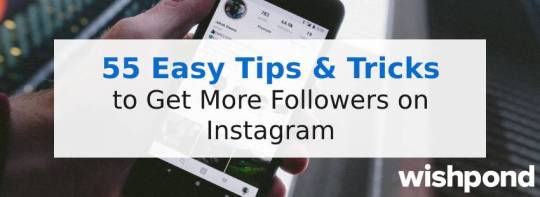
Developing a strong presence on Instagram is a powerful advantage in business. Popular Instagram accounts have sprouted multimillion-dollar businesses. Heck, some influencers make six figures for a single sponsored Instagram post.
While it isn't difficult to grow a following on Instagram, it isn't a cakewalk to get more followers on Instagram, either. Ask any social media marketer, and they'll tell you Instagram has a lot more strategy behind it than it seems.
If you're starting from scratch or looking to get more traction, there are lots of ways to improve your chances of increasing your followers on Instagram.
In this massive article, I've put together 55 easy tips and tricks to help you get more followers on Instagram. I've included several sections that cover your Instagram profile, best practices, account promotion, networking, analytics, campaigns, and more. These tips are easy to implement regardless of your experience, so check each one off and start getting more followers today.
Let's get started!
Table of Contents:
Your Instagram Profile
Connecting on Instagram
Who to Follow
Influencer Marketing Strategies
Photo Captions
Hashtag Strategies
Post Timing
Analytics
Instagram Campaigns
Your Instagram Profile
1. Choose a memorable username
A good way to grow your Instagram following is by having a username that’s short and easy to remember. This means it’s easier for people who have seen your account once to find it again in the future. It also means there’s a lower chance that users trying to tag you in a post will have a hard time finding you. Your best bet is the name of your brand.
*You can change the username of your Instagram account at any time but remember, you'll lose all previous tags from any posts you've been tagged in with your old username.
2. Have an intriguing profile picture
Your profile picture is like your Instagram first impression. If you’re an individual, a photo of your face is a good choice as it lets people know who you are. If you’re a business, use your logo to establish brand identity and to make it simple for users to make connections with any other marketing materials they may have seen from your brand.
3. Update your bio
Make sure your Instagram bio fits your business goals. Though brands like Adidas can get away with short, vague bios based on their sheer brand power, you’ll want to be a little more descriptive if you’re trying to get followers. If you’re selling products, mention what they are and briefly describe what makes them unique. If you have a physical store location, the bio of your Instagram account is a good place to include the address, as well as your opening hours.
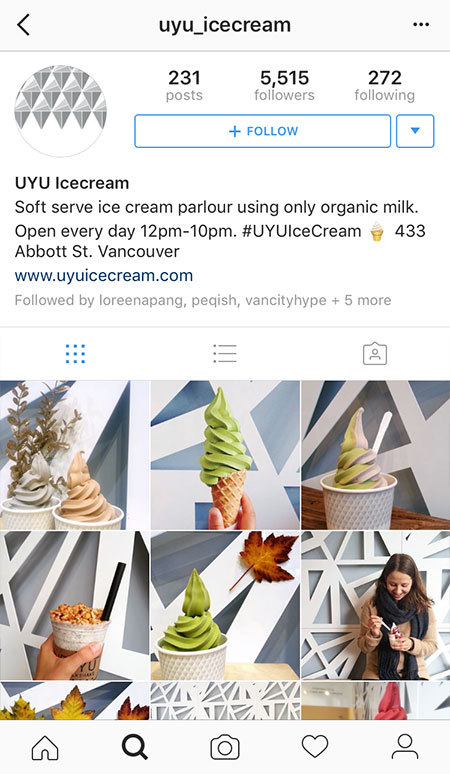
4. Link your Facebook and Instagram accounts
Linking your Facebook and Instagram accounts allows you to automatically post the media you’ve posted on Instagram to Facebook. Not only does it make it simple to share the same piece of content across two of the biggest and best social platforms, but it also allows you to leverage the reach you have on Facebook to grow your Instagram account. When you cross-promote between Instagram and Facebook, make sure your Facebook captions link to your Instagram profile, so you can turn Facebook fans into followers on Instagram.

Back to Top
Instagram Account Promotion
5. Share your account on other social networks
Though other social platforms aren’t as fully linked to Instagram as Facebook is, it’s still a good practice to reach out to the audiences you’ve built on other platforms. If you’re finding it difficult to get followers on Instagram from another network, consider offering an Instagram-only coupon or some other offer as an incentive.
6. Share your Instagram account to your email list
There are a few ways you can do this to get more followers on Instagram. You can send a single email newsletter urging people on your list to follow your Instagram account, or you can consistently feature your account in some way in your email marketing communications (through a social icon or a short CTA) to make sure you reach both new and old subscribers. Like the previous tip, offering Instagram-exclusive offers is sure to get more Instagram followers.
7. Promote your Instagram account on in-store materials
If you’re lucky enough to have a retail location, take advantage of it! Put up signs in your store advertising your Instagram account - even offer discounts to customers if they become new followers. You can also offer incentives in exchange for Instagram posts of your store with an @ mention; this pushes your brand out to your customers’ followers, helping get followers on Instagram and organically spread the word about your brand.
8. Promote your Instagram account on shipping materials
If you run an e-commerce business and regularly ship out products to your customers, consider adding a small card to each shipment with your Instagram profile and a CTA saying something like, “check out our Instagram profile for discounts and our new products!” Because these people are already customers, they’re likely to follow you on Instagram for discounts in the future.
9. Link to your Instagram account on your homepage
If your website is a large traffic driver, make sure you have social icons on your homepage to direct visitors to your social profiles including Instagram. Though this may not be a huge source of new followers for your Instagram profile, every little bit counts!
10. Embed your Instagram content in your blog posts
If it’s a part of your digital marketing strategy, your blog is another channel you can leverage to drive traffic towards your page, helping you get followers on Instagram. When using examples from your business’ marketing efforts, embed Instagram posts instead of using screenshots. Not only does this ensure you retain the quality of your blog post, it means readers can click onto your Instagram profile to follow you.
11. Use Instagram Ads
Because Instagram is owned by Facebook, it also has the advantage of using Facebook’s incredibly powerful Ads platform. Though Instagram Ads are a better choice if you’re looking to achieve a certain business goal - for example, increasing sales or driving traffic - you can also use them to introduce your profile to people within your target market. Using precise targeting, you can reach people with quality content and entice them into becoming followers on Instagram.
Back to Top
Instagram Content
12. Have a unique content strategy
To put it simply, there’s a lot of Instagram users out there. To stand out, your Instagram posts need to be unique. I can’t tell you what that is, but if you’re able to put together a feed of one-of-a-kind content still related to your business, you’ll find it’s easier to draw in followers. That being said, don’t be afraid to do what’s tried and true - there’s a reason images of food and scenery are so popular.
13. Maintain thematic consistency
Before you start to post on Instagram, think about what you want your Instagram feed to convey. Think about the types of photos you want to post and what content you want to share with your followers. Create rules or guidelines regarding content and captions for your profile that each of your Instagram posts must follow, and you’ll find it’s easy to create a seamless Instagram experience for your followers.
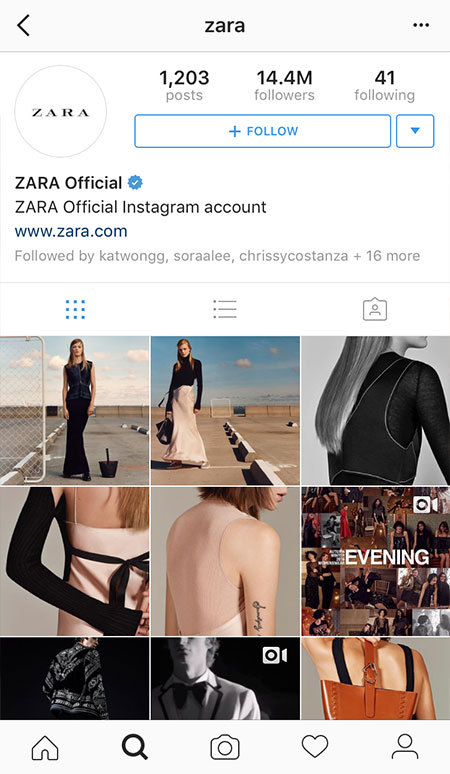
14. Go back through your feed and delete bad images
Every so often, look back through your profile and see if you can weed out any images that might not be in line with the guidelines you’ve created for your Instagram page. You want new visitors to your page to look through your profile and see a consistent theme and quality - this will help sell them on what your profile is offering and will increase the chance they’ll follow you.
15. Post high-quality images
This is a simple rule, but one I see businesses breaking all the time. You don’t need thousands of dollars of camera equipment to post good pictures to Instagram, but a blurry, over-filtered, low-resolution picture is a sure recipe for Instagram failure. Make sure yours are lit well, edited tastefully, and feature your subjects in clear focus. Newer smartphones like the iPhone or the Galaxy are safe bets for the ideal Instagram stills.

16. Share behind-the-scenes content
One of social media’s greatest advantages is the connection it promotes between users. For many, social media serves as a way to add personality to celebrities or businesses. To capitalize on this, give your followers a behind-the-scenes look at your business. For example, preview new products or show what a typical day looks like for employees in your office. Doing this makes it easier for people to make personal connections with your business - and increases the chances they’ll follow you.

17. Post quotes
Not everyone has time to take and edit photos all the time. If you’re on a consistent post schedule, you can fill gaps with quotes or text that resonates with your target market. This type of Instagram content is both engaging and easily shareable, even for people who might not necessarily be interested in your product. This helps you maintain your posting schedule while reaching new people within your target market.
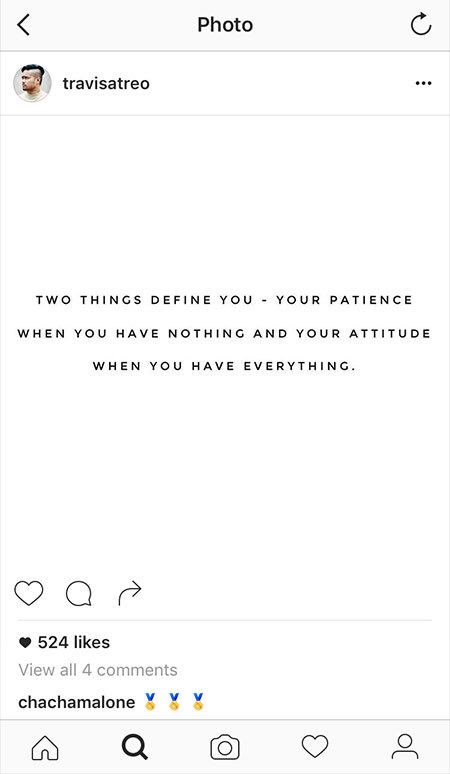
18. Use an app like VSCO to edit your photos
Using a photo editing app like VSCO can be just what you need to take your photos from good to great. Lightly editing photos makes them look unique and helps them to stand out on users’ Instagram feeds. Consistently using only a few different filters also helps to create an Instagram “signature” - a tactic that helps users pick out images that are from your brand. Just make sure you don’t go overboard with the edits!

19. Use a collage app to combine pictures
The more, the merrier, right? Using a collage app like Instagram’s Layout allows you to stitch several images into one. Though this isn’t always the best strategy, it can make room for some pretty interesting creative possibilities - which can pique viewers’ interests and turn them into your followers on Instagram.
20. Shoot creative videos
Instagram has been pushing video lately, upping the video length limit from 15 seconds to 1 minute just a few months ago. Take advantage of this, and get creative with the video medium to do things like showcasing your products or your employees.

21. Maintain your Instagram Story to keep followers engaged
Instagram’s Snapchat copycat product is starting to pick up steam. If you’re serious about your Instagram strategy, start taking some time to update your Snapchat story with any exciting news or new products. To increase engagement on your Stories, consider introducing limited-time discounts to post on your Stories.
22. Post pictures of people
Photos with people in them tend to receive more engagements than those without. When shooting images of your product, try to show someone using it - you’ll find this type of content is more well-received by Instagram users.
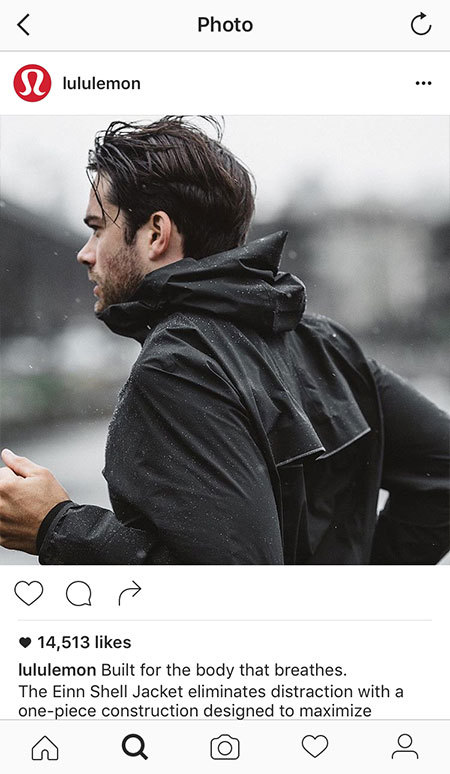
23. Tag people in your content
In addition to tagging the people that are actually in your photo, you might like to try tagging influencers or other brands if you’re trying to grow your profile. Not only does it alert them to your photo, but it actually causes the photo to show up on those profiles’ “tagged photos” section, introducing the possibility that their followers might find it.


Back to Top
Connecting on Instagram
24. Share user-generated content
User-generated content is free and authentic content that showcases your brand in a positive light. Always make sure to take the time to interact with the people who put effort into engaging with your brand on social. If someone’s posted a photo with your products on Instagram, you can like or comment on it - but why not go the extra step and share it on your business’ profile with an app like Repost? Sharing user-generated content not only makes the original poster feel appreciated but it shows your followers how others are enjoying your products.
25. Post media from events to be featured on the Events feed
Instagram recently introduced an “Events” feature in the Explore feed that highlights exciting goings-on near users. If your business is at an event, make sure you’re posting live from the Event - it just might get you featured in many local users’ Explore feeds.
26. Ask users to tag friends
There are a few reasons you can use to get users to tag their friends in your content. You could have a CTA in your caption that says something like, “tag a friend who would like this photo,” - or you could run a giveaway that requires users to tag friends in (and follow) to enter. This increases engagement and also drives up the chance you’ll end up on people’s Explore feeds.
27. Participate in the Instagram Blog’s Weekend Hashtag Project
Instagram’s Weekend Hashtag Project is a series the Instagram Community Team put together, featuring a weekly designated theme and hashtag. For example, #WHPescape highlighted Instagram users’ idea of a perfect weekend retreat, and #WHPfreetime showcased what Instagram users did in their free time. Participating in the Weekend Hashtag Project means your account could be featured on Instagram’s blog - which means a huge surge of traffic (and followers) to your account.

28. Like pictures on your Explore feed
Your Explore feed is made up of posts related to the posts you’ve liked and the people you follow. So, if you’ve been actively engaging on Instagram with your business account, it’s likely your Explore feed is filled with posts from people in your target market. Like these posts to increase engagement with other accounts within your industry.
29. Leave short comments on others’ photos
Though likes are great, comments are more personal ways to interact with other accounts. Avoid saying things like “great photo!” - rather, make some comment about the subject of the photo. “Cute dog��� works a lot better than “nice shot!”.
30. Comment on content from popular Instagrammers
Make it a point to engage with posts from Instagrammers who are popular in your industry. These users have tons of followers who see their content - meaning if you comment on their content, there’s a chance these users will see your comments. This could lead to them viewing your profile and - if your content is good - becoming followers on Instagram!
31. Respond to commenters
Social media should never be a one-way street. If you get comments on your content - yes, even generic, engagement-seeking comments like “Nice photo!” - take a second and respond. Even as little as a simple “Thanks!” will get you some brownie points and maybe even a follow. And always, always @ mention the person in comment replies, so they see it.
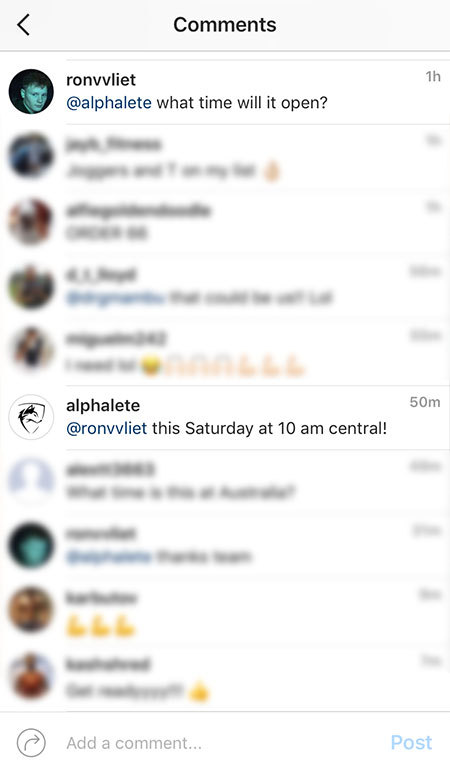
Back to Top
Who to Follow
32. Follow suggested users
Instagram’s suggested users feature uses an algorithm to connect you with those who are relevant to your account in some way - meaning that it’s easy to find accounts from within your industry. Following these accounts could get you a follow back.
33. Follow back industry accounts that follow you
Follow back accounts within your industry that follow you - if anyone checks this account’s followers, they’ll see your account. This has the potential for you to get more Instagram followers.
34. Follow accounts that your competitors follow
Chances are, the accounts your competitors follow are part of your target audience. Following these accounts on Instagram could get you a follow back - and because they’re in your target market, they’re a much higher value follower than others.
35. Follow accounts that follow your competitors
Same deal here. If they are interested in your competition’s products, there’s a pretty good chance they’ll be interested in yours, too. Follow them, and there’s a pretty good chance they’ll check into your account to see what you’re about. If you pique their interest, they’ll give you a follow.
Back to Top
Influencer Marketing Strategies
36. Host an influencer takeover
Hosting an influencer takeover allows you to step away from your normal content and let somebody else take the reins - and it opens up your account to your chosen influencer’s audience. Have the influencer promote the takeover on their account in the days leading up to it, so their followers have followed you by the time it begins.
37. Connect with influencers to feature your product
Paying or partnering with influencers to get them to post a photo featuring your product is another way to introduce your product to another audience. On top of this, the influencer’s audience will be more receptive to your product because it’s being featured by someone they admire and trust.
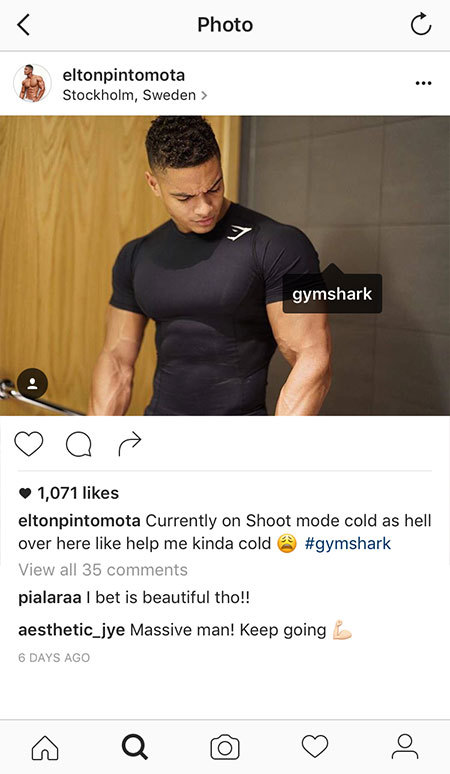

Back to Top
Photo Captions
38. Use a call to action in your photo captions
Though it might get annoying if you do it every time, consider adding a call to action in your captions like “follow us to get special Instagram discounts” to urge those viewing your content to become new followers. Sometimes, all they need is that little push.
39. Ask questions in photo captions
Another way to get viewers to engage with your Instagram posts is to ask questions in photo captions. Getting them thinking and engaging increases the likelihood that they’ll turn into followers.

40. Geotag your images
Geo-tagging posts allow people in similar areas to see your images more easily. Though this likely won’t be a huge driver for your follower count, it’s still a decent way to get your posts seen, especially by users near you.

Back to Top
Hashtag Strategies
41. Use relevant hashtags
Using hashtags related to your photo helps you target those who are interested in topics related to your brand and products. Relevant hashtags allow them to find your content through Instagram’s search - and if they find your profile interesting, they’ll likely become new followers.
42. Use popular hashtags
Though popular hashtags are less effective when trying to reach your target audience, they’re useful when trying to reach a wider group of people. Using hashtags like these isn’t a great way to get high-quality followers, but it is a good way to up that count. Use a site like Websta to find the most popular hashtags.
Here are the top 10 hashtags of all time:
#love
#instagood
#photooftheday
#tbt
#beautiful
#cute
#happy
#fashion
#followme
#me
43. Use a branded hashtag
If you find your brand is growing and people can’t seem to stop taking pictures with or of your products, consider creating a hashtag specific to your brand that people can post with. A branded hashtag helps to create a community of users who can spread your brand to their followers so you can increase your own following. Check out this simple example of a branded hashtag from fashion retailer H&M below.

44. Find local hashtags
Local hashtags are a sure strategy to reach those near you. Post photos in areas that are distinctly local, and tag them with hashtags related to your area. This forges a connection between you and your immediate market and could help you get the attention of potential customers.
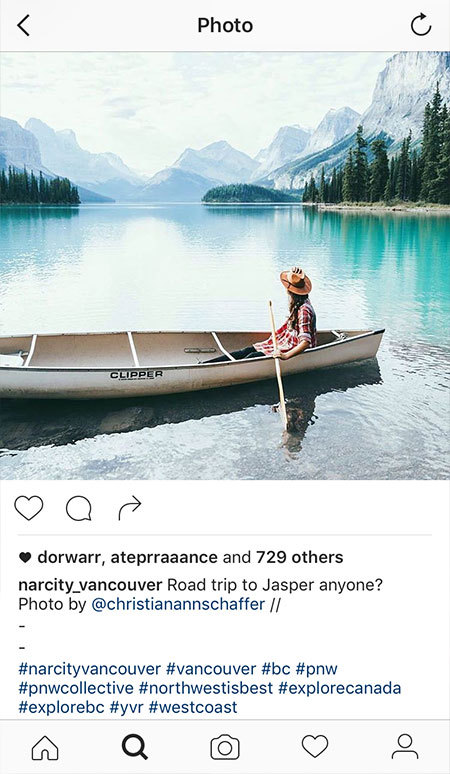

Back to Top
Post Timing
45. Maintain a consistent posting schedule
Posting consistently keeps current followers engaged and interested in your content and product and shows people visiting your profile for the first time that you’re a source for regularly posted, high-quality content.
46. Schedule posts with Later or Buffer
Not every marketer can take time in the middle of their days to set up and post an Instagram post. By using a tool like Later or Buffer, you can pre-plan your posts - edits, captions, and all - and schedule them to post at a later time and date. This helps a ton with maintaining that post schedule.
47. Post at high-traffic or low-traffic times
Though Instagram no longer organizes its feed chronologically, it does place some importance on post recency. This means posting at high-traffic times is likely to get your posts noticed by a larger number of people, leading to a higher chance you’ll get followers.
Interestingly, the opposite may also hold true. Posting at low-traffic times means you’ll be competing with fewer people to be at the top of your followers’ feeds, increasing your chances for high engagement.
48. Post often, but don't over-post
Followers - real followers - tend to put some time into considering whether or not to follow someone. One metric often used to make this decision is post frequency. Posting often shows potential followers that they won’t be following a “dead” account, increasing the chances that they’ll reward you with a follow.
On the other hand, there is such a thing as too much Instagram. Posting too much can have several negative effects: it shows a misunderstanding of optimal post scheduling and can clog up followers’ feeds - meaning they’re likely to get annoyed and unfollow you.
49. Find the best posting times (test) - think about the audience
This takes some time to get right. Test posting at different times to measure engagement. Check the likes, comments, and follows you receive at different times and tailor your post schedule to match. Also, think about your target market - if you’re in LA trying to reach customers in Sydney, you’ll want to schedule posts during times they’re awake.
Back to Top
Analytics
50. Use analytics tools to refine your Instagram strategy
If you want to dig deeper into your Instagram performance, consider investing in a service like Iconosquare or Crowdfire to look further into the people you follow and the people that follow you. These apps allow you do things like find people to follow (or unfollow), identify follower influence, and benchmark your performance against competitors - and will help you maximize your Instagram potential.
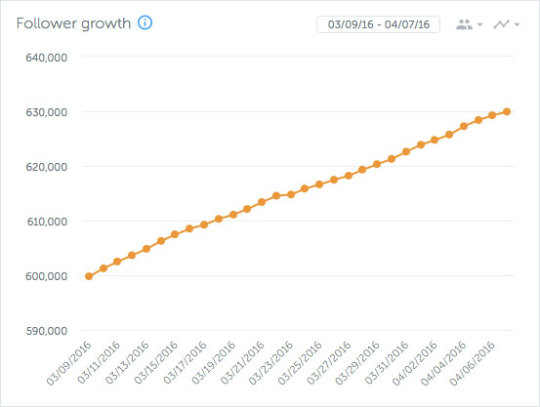
51. Set up your Instagram for Business account to get more detailed insights
One of Instagram’s little-discussed features is its suite of Business Tools. If you haven’t already, create an Instagram business profile for your business. This allows you to do things like add contact information to your profile, see impressions, top posts, and follower counts, and create promoted posts directly from the Instagram app.
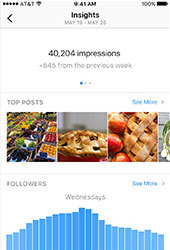
Back to Top
Instagram Campaigns
52. Run a teaser campaign to entice customers into following you
Much like a movie trailer, running a teaser campaign on Instagram for an upcoming product launch can catch viewers’ attention. Because they’ll want to know what comes of the teaser, there’s a good chance they’ll shoot you a follow.
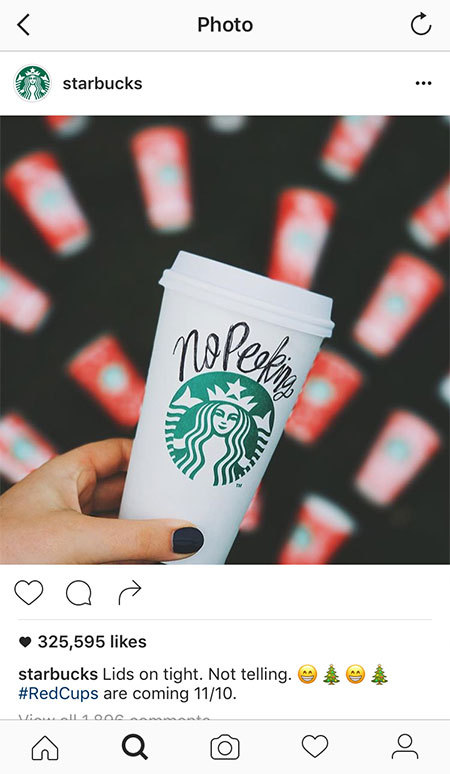
53. Run co-promotions with other brands
Find complementary products in your industry and reach out to them, suggesting a co-promotion. Running a giveaway or contest of some sort together allows you to promote to each others’ audiences - both of which are full of followers who will be interested in your products.
54. Run a giveaway
Three things are sure in life: death, taxes, and the fact that everybody likes free stuff. Running a giveaway is an easy way to get a surge of new followers - just require them to follow to enter (even better, get them to tag a few friends as well). Just make sure the prize you give away is something from your brand, so you know the followers you gain are interested in your product.
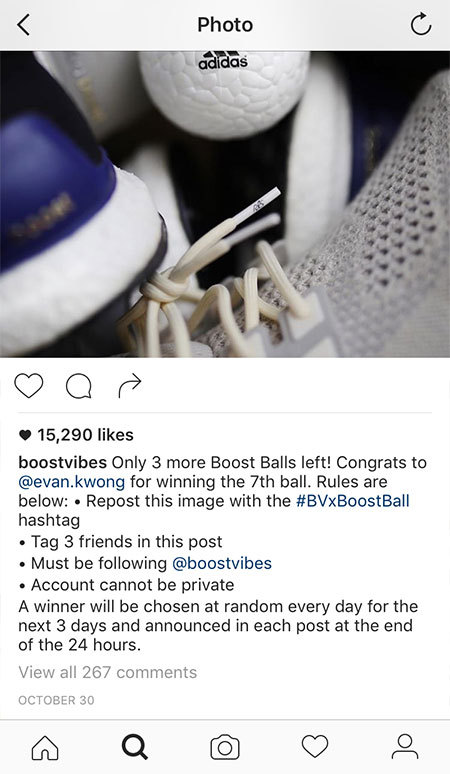
55. Run a contest
An Instagram photo contest is one of the top methods to engage your existing followers and gain new ones. By using a third-party app like Wishpond’s Contest Tool, you’re able to create a beautiful contest page featuring your contest details and a gallery of submissions from your participants. This helps to generate user content for future posts and increases your number of engaged followers.

There you have it! 55 awesome, foolproof ways to get more followers on Instagram. Let me know in the comments if you've tried any of these and if they helped you get more Instagram followers.
Related Content:
How to Get More Real Likes on Instagram: 45 Easy & Powerful Tips
How to Start a Bomb Fitness Instagram Account (With Examples)
How to Seriously Master Instagram Like a Pro
How to Market on Instagram: 30 Ideas, Tips & Examples
30 Best Instagram Business Tools to Help You Create Better Content
from RSSMix.com Mix ID 8230801 https://ift.tt/3e3H4h9 via IFTTT
0 notes
Text
why kim kibum is a RAVENCLAW
first of all kim kibum’s ugly ass can fight me for shoving his “““““““““““slytherin””””””””””” self in my face with all his stupid instagram posts this is the FIRST time i haven’t been excited about him posting. now let’s be real here the sorting hat must’ve been smoking some crack or something if it put kibum in slytherin………. he’s CLEARLY A RAVENCLAW and i have PROOF. SO MUCH proof that i’m about to write six pages of this shit!!!! ten virtual bucks and all of miss sha’s love to you if you actually read all of my anger induced rambling :)
okay!! now let’s get rowling’s awfully one dimensional and un-fleshed-out definition of what a ravenclaw is out of the way : the smart ones. that’s it. “wit beyond measure is man’s greatest treasure” blah blah all of that. basically the way she set it up in the (amazing) shitshow that was the harry potter books, most people interpreted it as “oh you do well in academics and stuff you get straight as and all that cool jazz so you must be a ravenclaw!” EXCEPT. getting good grades isn’t the only type of intelligence you can have and this especially applies to kibum because although i don’t know how well he did in school i do know that he has immense creative intelligence that screams ravenclaw AND NOT FUCKING SLYTHERIN GOD DAMN IT. also point number two!! if that was the only thing that made you a ravenclaw then hermione wouldn’t be a goddamn gryffindor. if you think back to book one (for those of you that have forgotten already, that’s the sorcerer’s stone or the philosopher’s stone depending on where you came from - a completely unnecessary change that still baffles me because despite the fact that americans are dumb i don’t think we’re THAT dumb that we wouldn’t know what a philosopher is but i digress) there’s that scene while they’re in room with the logic test with the poison and she says something along the lines of “yeah logic and cleverness is great and all but bravery and friendship is where it’s at harry!! now go beat voldemort’s ass!” (keep in mind i don’t have the books in front of me right now lol) it’s because she values those gryffindor qualities more than she values the qualities of intelligence that she was placed in gryffindor but that wasn’t very well expanded on in the books and it isn’t super relevant to ravenclaw kibum so i’ll move on.
one of my biggest points is the whole intelligence isn’t limited to getting good grades in school one. so in 1983 a developmental psychologist (don’t know what that is and i’m too lazy to google but i’m assuming he knew what he was talking about) came up with this theory?? idea?? whatever. that there are in fact nine different types of intelligence and you can’t bullet point in essays so bear with me: there’s naturalist intelligence which is like nature and stuff… not my thing and not kibum’s either so we’ll move forward; musical intelligence - let’s stop this list right here so i can point a giant finger at kibum’s obvious musical talent (which fingers crossed we’ll get to see in his solo album which will happen i have hope) - logical/mathematical (it took me four tries to spell that right could you believe i used to be a three time school spelling bee champion hahhahhahah) which is what i believe most people think of when they think “intelligence;” existential (why do we exist? what is our purpose here on earth? what the fuck exactly is a human? what is consciousness? this is for the ones who have existential crises every other day congrats you’re smart). this paragraph is getting too long lemme move to the next one -
yes hi where were we : interpersonal! this is a another one i think kibum has a lot of; he’s really extroverted and have you ever noticed that he knows like. everyone because he makes friends super easily and everything?? he knows how people work and he’s comfortable around them. next, linguistic intelligence, which he possesses a lot of too - we all know the man’s smart as hell when it comes to languages it’s real sexy; intra-personal (this is like…. knowing yourself and your thoughts/feelings which sounds fake to me but whatever); and last but not least (or yes least depending on how much of it you have) spatial intelligence which yeah kibum has a lot of because this applies to visual art and stuff and also comes in handy if you’re an engineer. (shout out to any of those reading this now stop and go do your job or something fucking nerds!)
so we’ve established that kibum is super intelligent, especially creatively, which you already should’ve known if you’ve been a shawol for longer than two seconds or aren’t stanning solely for visuals… my point is : kibum’s a smart dude!! so one box for ravenclaw checked! i’m not trying to say if you’re not a ravenclaw you’re stupid by the way because all of this means jack shit if you don’t value your intelligence, which brings us back to the whole situation with hermione - she was in gryffindor because gryffindor’s qualities were more important to her. but i think it’s clear kibum takes a whole lot of pride in his creative accomplishments and he’s always looking to add more to his loooooong resumé of cool shit i’ve done at such a young age (taemin has one of those except his is cool shit i’ve done at an even younger age). it’s these traits of his that stand out the most in my opinion which checks another ravenclaw kibum box!
completely unrelated to actual house sorting but kibum looks incredible in blue. pretend i attached pictures for reference.
listen being in ravenclaw isn’t all flowers and rainbows (that’s more hufflepuff; you can find them in the kitchens xx). this emphasis on logic and intelligence can often create a chasm between the more human side of things. ravenclaws tend to forget that emotion plays just a big a part in how things work as pure, cold logic does - which obviously doesn’t always apply, because interpersonal intelligence is a facet of ravenclawism?? let’s pretend that’s a word. ravenclaws can also be real perfectionists and super hard on themselves. and don’t forget that they can get big heads too - placing a higher value on intelligence, creative or not, doesn’t make you better than the rest of the houses, ravenclaws.
trust me, i know. i’m a ravenclaw. fuck pottermore.
i just realized something. in any proper school essay, you never just jump into things the way i did. idk if any of you learned tags?? theme, author, general, specific (or something like that; forgive me if i can’t remember, oh sophomore year honors english teacher) but yeah i forgot to do all that and just kinda went KIBUM IS A RAVENCLAW FUCK HIM so…
i’m assuming whoever’s reading this has either read and/or watched at least one of the harry potter books/movies. if you’ve only ever seen the movies (or worse, just one movie) get the fuck out of my sight! nah, just kidding, i’m ready to explain all this shit to y’all. so buckle in, kids and non kids, because you’re about to have a crash course on hogwarts school of witchcraft and wizardry completely from my shitty memory!
so hogwarts is this amazing school in england that teaches young, impressionable kids magic tricks but with real magic. it’s the wave your wand, say the latin inspired magic words, and boom! you just turned your rat into a teacup (or if you’re ron, you got stuck halfway and now peter pettigrew is having the worst time of his life since [spoiler]). it’s pretty much the most dangerous place you can send your kid especially if one (1) harry james potter is in the student body, because this snake man with no nose is coming to get him because he’s holding a ten year or so grudge that he couldn’t kill him when he wanted to. also [spoiler] plays a part in that lmao voldemort isn’t that shallow. but he is pretty shallow.
on your first day at this super cool school you put a magic talking hat on your head and it compartmentalizes you into one of four houses based on your personality, your values, and your strengths. it’s like divergent except less black and white. (and if you’ve seen/read divergent and not harry potter get your fucking priorities in order wtf???) you’ve probably heard of these houses - gryffindor, slytherin, ravenclaw, and hufflepuff - even if you know shit about harry potter because you’re friend has said to you “oh yeah i’m a hufflepuff” and you went “oh cool haha sounds fucking dumb” and unfortunately for your poor hufflepuff friend most people look down on hufflepuff. thank god that’s changing and fuck rowling for making it that way. no one has time for her silly “all slytherins are evil” narrative.
rowling-wise (hope y’all are realizing by now that i’m not her biggest fan) the houses are pretty much as one-dimensional as divergent was: gryffindor was for the big, strong, brave people; ravenclaw for the smart; slytherin for… well, evil; and everyone else gets to be a hufflepuff and get labelled as nice. nothing wrong with being nice, but if you’re just nice, you’re boring, and hey, hufflepuffs don’t deserve that. maybe it’s tweaking canon a bit, but fandom has collectively shifted away from these stereotypes and effectively (more effectively than rowling, at least) expanded on what actually makes a gryffindor a gryffindor and so forth. (also, yeah, i thought i was a hufflepuff for years before i took a good look at myself in the mirror and realized i’m a lazy piece of shit that doesn’t deserve to be in that house)
off the top of my head, hogwarts was founded by four wizards with varying levels of assholishness, and their last names are where we get the houses. each one of them basically picked the qualities they wanted to see in their students (gg : “i want the loudmouths who are brave and awesome!” rr: “i want the ones who think being smart is sexy” ss: “i want the ambitious prideful ones” and lovely helga hufflepuff was like “cool i’ll just take the rest they’re amazing too”) and so the houses were formed. things quickly unraveled after that because mr. slytherin was a racist piece of shit and he only wanted the “pure-blooded” families to send their kids to hogwarts (meaning the ones wizarding families who were all wizards) and the rest were like “wtf bro?? what about the mixed kids. or the random muggle-borns blessed with the ability to bewitch??” and salazar was like “nah i’m out goodbye fuckers i hate you all for being open-minded and shit.” so, i mean, it really doesn’t come as a surprise that slytherin gets such a bad rep considering the first ever slytherin was on the high end of the asshole spectrum. and then all that shit with the [spoiler] in chamber of secrets happened, so not only was he an asshole, but he was also fucking insane. good riddance. but the rest stayed, and they made hogwarts famous, and then they died and became ghosts to haunt the corridors of the school or whatever.
so now that your brief hogwarts, a history lesson is over, let’s talk a little more about slytherin because i feel like it! also the whole idea about all slytherins being evil, power-hungry, greedy fuckers is wrong and needs to be dispelled. yes, power does play a huge role in who a slytherin is, but it doesn’t necessarily have to be a “crush everyone underneath me” kind of thing - it’s more like an ambition-driven one. sure, a lot of slytherins are bad, like, say, voldemort, who was so obsessed with power and living forever that he pretty much killed himself, with a little bit of help from our lovely hero harry. and like… i could go into detail about how horrible and abusive snape was (yes he did have a few good qualities but they certainly weren’t redeeming ones fuck off) but i’d max out the number of pages for this essay so maybe another time. if you’re a snape apologist…… well i hope you see the light soon. that’s a real stain on your person. but yeah - not every single slytherin you see is pure evil; regulus black exists (please read the books) and like. narcissa malfoy just wanted to protect her son, you know? doesn’t excuse most of the shit she did but her intentions weren’t completely “oh i want to be powerful also i’m better than everyone because i’m pureblood and you’re not haha.”
also taemin!! there’s a lovely slytherin. smart, ambitious, sweet, great smile, i’ll stop before this turns into a soft rant - taemin is textbook slytherin but surprise he isn’t in the game just so he can put other people down. and i wasn’t serious about my other if you’re blank then stop reading this but if you don’t think taemin’s a slytherin you can exit. right now. i’m serious i don’t want to be associated with y’all. AND IT’S EVEN WORSE IF YOU THINK HE’S A HUFFLEPUFF!!! you’re going to put lee “work over relationships” taemin into hufflepuff? he’s pure slytherin; he’s driven by ambition - idk if you noticed when he was talking about his budokan concerts but he mentioned how he worked so hard on it for his own sake. he wanted to prove to himself as well as others that he could pull off something so grand and incredible (and he did but once again that’s soft rant territory so i’ll pull back) and that’s slytherin. this isn’t necessarily in a bad way, but he’s so willing to throw his members under the bus for his own sake - go watch their weekly idol. THAT DOESN’T MAKE HIM EVIL LMAO a big part of being a slytherin is relationships with others!! when the worst comes to worst, loyalty is important to slytherins. it’s not one of their defining characteristics like it is for gryffindor but it’s still super important. that’s not to say he doesn’t have hufflepuff traits (y’know, working hard! being dedicated!) but those coupled with entirely slytherin motivations of proving oneself and becoming the best they can be point him towards slytherin’s direction. slytherins have a tendency of throwing everyone and everything away (including, many times, themselves) for the sake of achieving their goal and taemin is a perfect example of that. sure, he’s as sweet as a person who laughs when other people are crying can be, but that doesn’t automatically make him a hufflepuff. it’s not like everyone who isn’t a hufflepuff is mean or that every hufflepuff is a gooey pile of chocolate and sunshine.
anyway… this is about kibum…
(fun fact : the animal associated with the ravenclaw house is actually an eagle. something about soaring to new intellectual heights or something. would’ve been easier to just make it a raven because it’s not like ravens can’t fly too but whatever.)
probably one of the biggest roadblocks with sorting people into hogwarts houses is the overlap that occurs between traits of different houses. having one trait - or even a few of them - doesn’t automatically mean you fit solidly into a house, because you have to take your own ideals and values into account, as well as the way you approach things in life. it’s not to say kibum isn’t ambitious, because yeah, he is, but the way his ambition is directed towards his creative pursuits for the sake of expanding his creative intelligence is a ravenclaw thing you know?? same with jonghyun (who is also a ravenclaw) - the way he approaches all of his creative pursuits is completely in the artistic sense. jonghyun is creatively brilliant - let’s look at his radio show, or his song-writing, or his composing, or his book writing, etc. - and just because he’s a ravenclaw doesn’t mean he’s not ambitious. sure he’s ambitious but is anyone sitting here calling him a slytherin?? no, seriously - does anyone think jonghyun’s a slytherin? because i’ve never seen that. most people put him in hufflepuff and not ravenclaw… but why? is it because he’s soft? because that’s a hell of a stereotype, too, and it’s not like all ravenclaws are cold, emotionally detached bitches who only care about getting 100 percents on their quizzes.
what i’m trying to say is people can’t be categorized into boxes the way the houses were originally constructed; otherwise, most of the population would just be hufflepuffs. sorting also takes your personal wishes, your goals, what you think is important into consideration. so, yeah, if kibum really wanted he could totally be a slytherin, but it would pretty much be for the sake of being a slytherin because that cunning is not what he deems most important. let’s go back to harry potter himself - the sorting hat was really fucking ready to put him in slytherin, and as much as you can argue that it was because a piece of voldemort, of evil, was in him or whatever, you can’t deny that harry has a lot of inherently slytherin traits. he knows how to work people, he knows how to get out of tricky situations because he’s witty and yeah, cunning as hell. and yes, he asked not to be put in slytherin, but that’s mainly because he walked into hogwarts having heard nothing but stereotypes about the house (like that one line that ron said about how not everyone in slytherin was evil but how everyone evil came from slytherin, the whole square rectangle relationship). and keep in mind that he didn’t specifically ask to be put into gryffindor but that the sorting hat recognized those qualities that he also had and the fact that he valued them more as well and made the decision to sort him into gryffindor.
sorting is a tricky business, thanks to those gray areas. there are ravenclaws that could be academically behind others, but they work their asses off because they want to learn. hard work is, again, technically a hufflepuff trait but their objective, their main focus, is the learning aspect which makes them a ravenclaw! an excellent real life example would be minho, who you can argue has several gryffindor traits, like… he’s loud and i guess he’s brave and all, but hufflepuff fits him a thousand times better. the importance he places on relationships and especially loyalty is purely hufflepuff and he makes a damn good one, too. i think that’s what annoys me most about people who think taemin’s too “sweet” or “nice” to be a slytherin - i hate to break it to you, but not every slytherin is mean and selfish. they just value being at the top because they believe they deserve it, and you can’t really fault a person for that, and it doesn’t mean they think everyone else is automatically lesser, either.
i’m going to wrap this up now because i want to watch final life and i’ve also made pretty much every point i can think of right now. kibum might be out there dropping $100+ on overpriced slytherin wands and parading around in his slytherin scarf but honestly? i’m still convinced he’s a ravenclaw because it just fits him so much better. but i guess slytherin is a good second choice! he really made me angry enough to write an entire goddamn essay about this wow
#shinee#key#amar rata#kim kibum#RAVENCLAW KIBUM#i'm serious about the slyth taemin thing by the way#i'm gonna go watch final life now and support my baby bye#mine
3 notes
·
View notes
Text
How to Rank Your Old, Outdated Content
email marketing list services

What percentage of your search traffic is driven by your top 10 pages?
Chances are, it’s a large portion.
Just look at the screenshot below. You’ll see that my top 10 pages drive 28.7% of my search traffic.

That may not seem like a high number, but I have 5,441 blog posts. In other words, 0.1% of my pages make up 28.7% of my search traffic.
Typically, with smaller sites, the percentages are much higher in which the top 10 pages make up the majority of their search traffic.
So, what does that tell you?
You should just focus on your top 10 pages and ignore the rest? Or, even worse, just focus on cranking out more new content?
Quality over quantity
I used to have the philosophy of “more is better.” I was cranking out dozens of articles each week. At one point, I was publishing 2 articles a day on this blog.
And, over time, my traffic grew, but not by much.
I was spending all of this time writing and realized that the majority of the content I was publishing never ranked.
So, what did I do?
I started focusing on my old, outdated content to boost my traffic.
Just think of it this way: Every week I publish one new piece of content, but my team, on average, is updating 23 older articles.
When I used to write more frequently, my top 10 pages made up 33% of my search traffic.

Since then, I have increased my search traffic by 107% and reduced my reliance on my top 10 pages by 13%.
So how did I do this? Well, as I mentioned, I have my team focus on updating my old, outdated content while I focus on creating new content.
Here’s exactly what I have my team implement, step by step.
Look for pages that were once loved
With Google Search Console, you have access to data for a much longer period of time. You can go back up to 16 months.
So, I want you to compare this month’s results during the same period as last year.
You can do this by clicking on “date” and then “compare.” Next, select your older date period first (should be roughly from a year ago) and then select today’s date period.
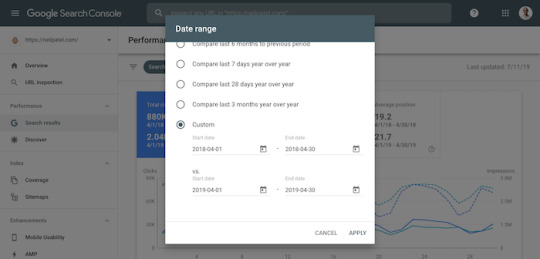
I’ve been doing this for a while, so I selected an older date range so you can see a better set of data before my team really focused on updating old content.
You should then see a report that looks something like this:
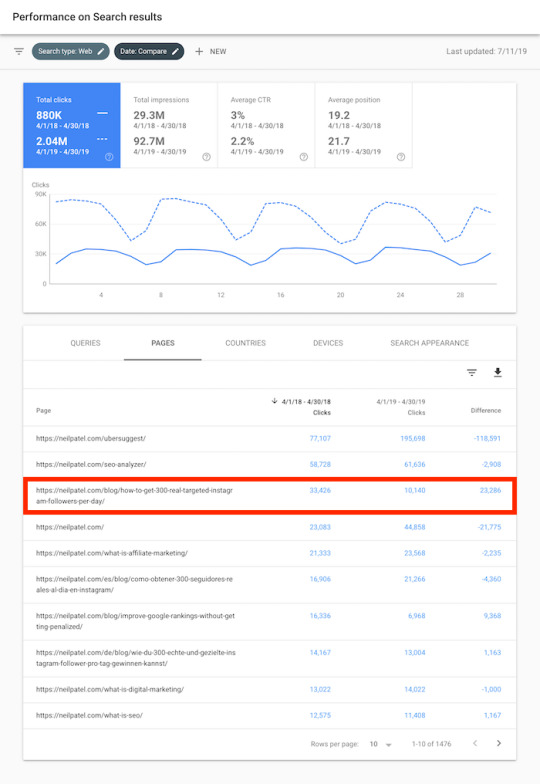
What you’ll want to do is look for articles that used to get a ton of traffic and have less now. From the screenshot above, you can see that my article on Instagram used to perform really well, but no so much anymore.
Keep in mind that I selected the older date range first. I did this to see which of my old pieces of content used to rank well so I can see if any of them have dropped over the last 12 months.
This will show you old content that Google used to love, but no longer does.
Now, let’s find content that Google never loved.
Look for pages Google never loved
Log back into Search Console and look for pages that have a high impression count but never got any real clicks.
The easiest way to find these pages is to set your date range to the last 28 days and look at each page’s metrics from an impression, click, and CTR perspective.
Sort the CTR column in ascending order (lowest percentage at the top, the highest percentage at the bottom).

Typically, the pages at the top of that list have the most potential. It means that Google is ranking you but you just aren’t getting too many clicks.
It usually isn’t just related to your title tag and meta description. It typically has to do with the content on the page.
Now it’s time to create a list of pages that have the greatest potential.
It’s time to prioritize
Typically, the pages that have the most potential are the ones that used to rank but no longer rank. Google used to rank and like them, which means if you give those pages a little tender loving care, you can easily get them loved by Google again.
The second group of pages that have potential, but not as much as the first, are the ones with a high impression count but an extremely low CTR.
These pages are harder to fix because they never really performed that well.
How to update your old content
Now that you have a list of pages to fix so you can boost your search engine rankings, I want you to log in to Google Search Console, find that article, click on it, and then click on “queries.”

For the keywords that don’t rank in the top 5 or have a high impression volume, I want you to go to your ranking article and see if the article is relevant for that term.
If not, adjust the article to at least include that term and cover that topic.
For the terms you already rank for in the top 5 spots, head over to Ubersuggest and type in those keywords and click on the keyword ideas report.
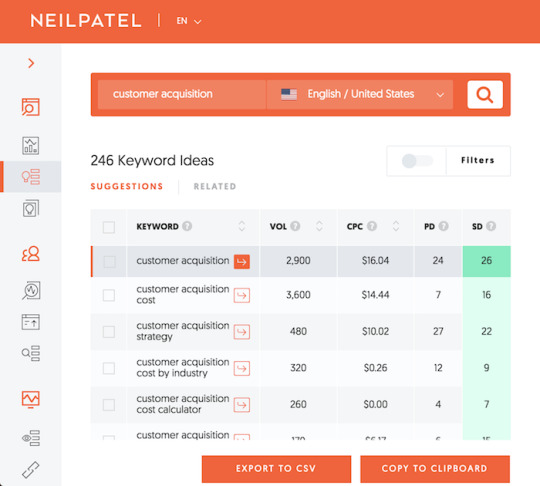
You’ll then see a report with all of the long-tail variations of that keyword.
If you adjust the article and include any of the long-tail phrases Ubersuggest gives you, you’ll see quick traffic gains.
In other words, if you already rank for the head term, it’s not hard to rank for the long-tail variation of it as well.
In addition to including the right keywords, you’ll want to update the post. Make sure all of the information is relevant, the pictures are up to date, and if you could include any multimedia (like embedding relevant YouTube videos) you’ll be able to increase the time on site of your visitors.
Finally, when updating your content, make sure your article is more thorough than all of the other sites that rank for the terms you are trying to rank for.
Remember that keyword ideas report I had you check out on Ubersuggest? On the right-hand side of that report, it shows you all of the sites that rank for that keyword.

You can quickly see who’s currently ranking in each country, visit their web page, and make sure you create something better.
User metrics
User behavior is one of the biggest factors with Google’s algorithm.
Once you update your old content, you’ll want to optimize for user signals as that’ll help boost rankings.
A great example of user metrics is optimizing your title tags and meta description.
For example, if everyone searched a keyword on Google and clicked on the second result instead of the first, it tells Google that the second result is more relevant and that it should be ranking in the first spot instead of the second.
And Google eventually would make that change.
If you can use persuasive copy and convince people to click on your search listing instead of the competition, eventually your rankings will climb. And you can do so by following these 2 articles:
How to Craft Amazing Headlines
How to Write Copy like Apple
Over the years, I’ve done a lot of title tag and meta description tests and I’ve also found that these keywords help increase clicks:
What is
Best
Amazing
[lists]
How to
Free
You
Tips
Why
Tricks
Great
You can also use tools like Clickflow to A/B test your meta tags.
Don’t forget to promote (again)
Now that your content is up to date and you’ve optimized your meta tags for clicks, it’s time for you to promote your content.
I know what you are thinking… why would you promote old content, right?
Well, technically it isn’t old anymore.
First of all, you should update the published date or last updated date within your WordPress.

That way search engines know your content is changed, more relevant, and up to date.
Secondly, you need to promote the article. It’s new now, so why wouldn’t you share it with the world?
The simplest thing you can do is share it on the social web. I typically share my content on Facebook, Twitter, and LinkedIn… but you can pick whatever social profiles you have.
Although Google doesn’t really look at social signals, Bing does. Plus, some people who visit your page from the social web may decide to link to your article, which does help rankings.
And if you want to go above and beyond, check out Meet Edgar. It’s what I use to continually schedule my old content to be promoted on the social web. That way I don’t have to manually do it or set reminders.
In addition to social shares, you should consider sending out a text-based email blast to your audience promoting your content.
It’s a great way to get a quick boost of traffic and breathe life into your old content.
Here’s an example of a text-based email blast that I send so you can copy my format.
Subject: How to Generate 10K visitors from a Brand New Blog in Under 6 Months
If I tell you to do 100 things to grow your traffic, I know you won’t do it.
Heck, even I wouldn’t. It’s just too much work.
In the spirit of simplicity, just do this and you’ll get to 10,000 visitors.
I’ll even make a deal with you. If you follow it and don’t hit 10,000 visitors and you can show me you followed it, I will help you for free.
That’s how confident I am that it works.
Cheers,
Neil Patel

As you can see, simple text-based emails are generating 30% open rates and 6% click rates for me. Not too shabby.
You can also use tools like Subscribers to send out a push notification. Every time I update a post I send out a push. Look at my stats… I can easily generate an extra 7,000 visitors from a single push.

And don’t forget to build links
The last step you want to leverage is link building. You can use Backlinks to see who is linking to competing articles:
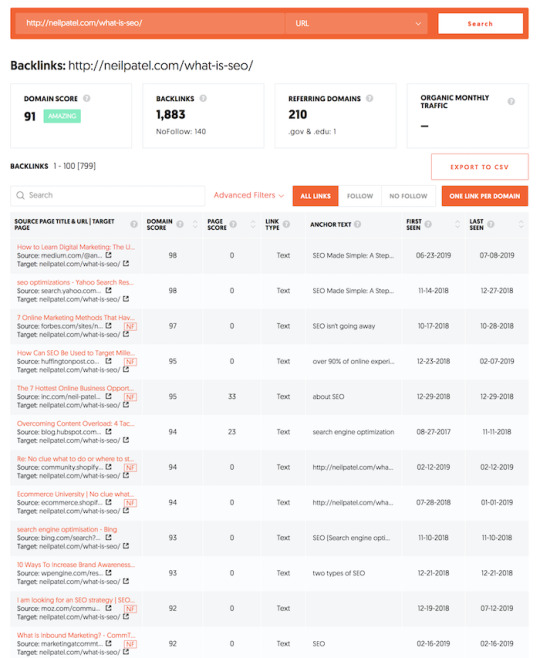
All you have to do is put in a competing URL and select “URL” from the drop-down menu and you’ll see every site that links to that page.
From there, you’ll want to reach out to each site and ask them to link to you.
The easiest way to do this is to leverage the skyscraper technique and the steps in this article.
Conclusion
Once you hit the 150 mark in the number of pages on your site, you should consider focusing the majority of your time to updating old content instead of creating new content.
If you have over 1,000 pages, you should definitely spend 80-plus percent of your time updating old content instead of writing new content.
The key to ranking your old, outdated content is to first focus on the content that used to rank but doesn’t anymore.
Once you fix those pages, you should see results within a month or two. From there, you can then focus on pages that have a high impression count but a low click count.
So, are you going to focus your time on ranking your old content or creating new content?





Youtobe
0 notes
Text
How to Rank Your Old, Outdated Content
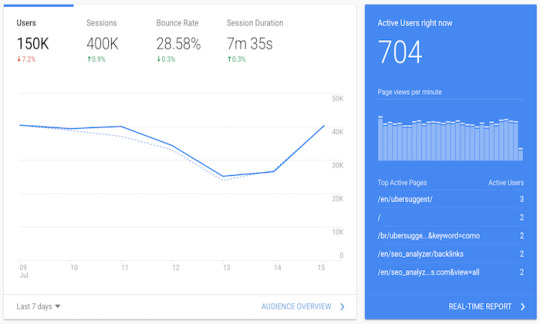
What percentage of your search traffic is driven by your top 10 pages?
Chances are, it’s a large portion.
Just look at the screenshot below. You’ll see that my top 10 pages drive 28.7% of my search traffic.

That may not seem like a high number, but I have 5,441 blog posts. In other words, 0.1% of my pages make up 28.7% of my search traffic.
Typically, with smaller sites, the percentages are much higher in which the top 10 pages make up the majority of their search traffic.
So, what does that tell you?
You should just focus on your top 10 pages and ignore the rest? Or, even worse, just focus on cranking out more new content?
Quality over quantity
I used to have the philosophy of “more is better.” I was cranking out dozens of articles each week. At one point, I was publishing 2 articles a day on this blog.
And, over time, my traffic grew, but not by much.
I was spending all of this time writing and realized that the majority of the content I was publishing never ranked.
So, what did I do?
I started focusing on my old, outdated content to boost my traffic.
Just think of it this way: Every week I publish one new piece of content, but my team, on average, is updating 23 older articles.
When I used to write more frequently, my top 10 pages made up 33% of my search traffic.
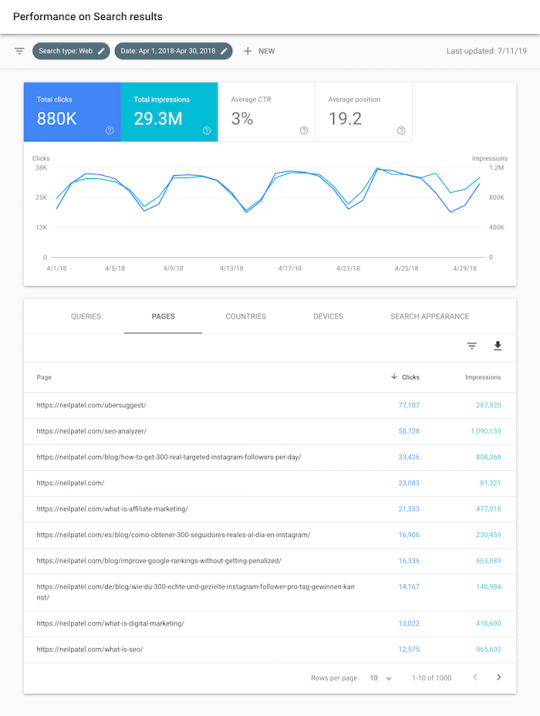
Since then, I have increased my search traffic by 107% and reduced my reliance on my top 10 pages by 13%.
So how did I do this? Well, as I mentioned, I have my team focus on updating my old, outdated content while I focus on creating new content.
Here’s exactly what I have my team implement, step by step.
Look for pages that were once loved
With Google Search Console, you have access to data for a much longer period of time. You can go back up to 16 months.
So, I want you to compare this month’s results during the same period as last year.
You can do this by clicking on “date” and then “compare.” Next, select your older date period first (should be roughly from a year ago) and then select today’s date period.

I’ve been doing this for a while, so I selected an older date range so you can see a better set of data before my team really focused on updating old content.
You should then see a report that looks something like this:

What you’ll want to do is look for articles that used to get a ton of traffic and have less now. From the screenshot above, you can see that my article on Instagram used to perform really well, but no so much anymore.
Keep in mind that I selected the older date range first. I did this to see which of my old pieces of content used to rank well so I can see if any of them have dropped over the last 12 months.
This will show you old content that Google used to love, but no longer does.
Now, let’s find content that Google never loved.
Look for pages Google never loved
Log back into Search Console and look for pages that have a high impression count but never got any real clicks.
The easiest way to find these pages is to set your date range to the last 28 days and look at each page’s metrics from an impression, click, and CTR perspective.
Sort the CTR column in ascending order (lowest percentage at the top, the highest percentage at the bottom).

Typically, the pages at the top of that list have the most potential. It means that Google is ranking you but you just aren’t getting too many clicks.
It usually isn’t just related to your title tag and meta description. It typically has to do with the content on the page.
Now it’s time to create a list of pages that have the greatest potential.
It’s time to prioritize
Typically, the pages that have the most potential are the ones that used to rank but no longer rank. Google used to rank and like them, which means if you give those pages a little tender loving care, you can easily get them loved by Google again.
The second group of pages that have potential, but not as much as the first, are the ones with a high impression count but an extremely low CTR.
These pages are harder to fix because they never really performed that well.
How to update your old content
Now that you have a list of pages to fix so you can boost your search engine rankings, I want you to log in to Google Search Console, find that article, click on it, and then click on “queries.”

For the keywords that don’t rank in the top 5 or have a high impression volume, I want you to go to your ranking article and see if the article is relevant for that term.
If not, adjust the article to at least include that term and cover that topic.
For the terms you already rank for in the top 5 spots, head over to Ubersuggest and type in those keywords and click on the keyword ideas report.

You’ll then see a report with all of the long-tail variations of that keyword.
If you adjust the article and include any of the long-tail phrases Ubersuggest gives you, you’ll see quick traffic gains.
In other words, if you already rank for the head term, it’s not hard to rank for the long-tail variation of it as well.
In addition to including the right keywords, you’ll want to update the post. Make sure all of the information is relevant, the pictures are up to date, and if you could include any multimedia (like embedding relevant YouTube videos) you’ll be able to increase the time on site of your visitors.
Finally, when updating your content, make sure your article is more thorough than all of the other sites that rank for the terms you are trying to rank for.
Remember that keyword ideas report I had you check out on Ubersuggest? On the right-hand side of that report, it shows you all of the sites that rank for that keyword.
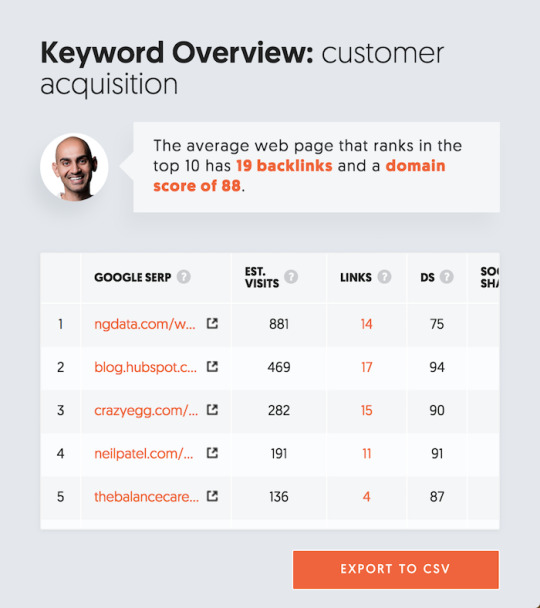
You can quickly see who’s currently ranking in each country, visit their web page, and make sure you create something better.
User metrics
User behavior is one of the biggest factors with Google’s algorithm.
Once you update your old content, you’ll want to optimize for user signals as that’ll help boost rankings.
A great example of user metrics is optimizing your title tags and meta description.
For example, if everyone searched a keyword on Google and clicked on the second result instead of the first, it tells Google that the second result is more relevant and that it should be ranking in the first spot instead of the second.
And Google eventually would make that change.
If you can use persuasive copy and convince people to click on your search listing instead of the competition, eventually your rankings will climb. And you can do so by following these 2 articles:
How to Craft Amazing Headlines
How to Write Copy like Apple
Over the years, I’ve done a lot of title tag and meta description tests and I’ve also found that these keywords help increase clicks:
What is
Best
Amazing
[lists]
How to
Free
You
Tips
Why
Tricks
Great
You can also use tools like Clickflow to A/B test your meta tags.
Don’t forget to promote (again)
Now that your content is up to date and you’ve optimized your meta tags for clicks, it’s time for you to promote your content.
I know what you are thinking… why would you promote old content, right?
Well, technically it isn’t old anymore.
First of all, you should update the published date or last updated date within your WordPress.

That way search engines know your content is changed, more relevant, and up to date.
Secondly, you need to promote the article. It’s new now, so why wouldn’t you share it with the world?
The simplest thing you can do is share it on the social web. I typically share my content on Facebook, Twitter, and LinkedIn… but you can pick whatever social profiles you have.
Although Google doesn’t really look at social signals, Bing does. Plus, some people who visit your page from the social web may decide to link to your article, which does help rankings.
And if you want to go above and beyond, check out Meet Edgar. It’s what I use to continually schedule my old content to be promoted on the social web. That way I don’t have to manually do it or set reminders.
In addition to social shares, you should consider sending out a text-based email blast to your audience promoting your content.
It’s a great way to get a quick boost of traffic and breathe life into your old content.
Here’s an example of a text-based email blast that I send so you can copy my format.
Subject: How to Generate 10K visitors from a Brand New Blog in Under 6 Months
If I tell you to do 100 things to grow your traffic, I know you won’t do it.
Heck, even I wouldn’t. It’s just too much work.
In the spirit of simplicity, just do this and you’ll get to 10,000 visitors.
I’ll even make a deal with you. If you follow it and don’t hit 10,000 visitors and you can show me you followed it, I will help you for free.
That’s how confident I am that it works.
Cheers,
Neil Patel

As you can see, simple text-based emails are generating 30% open rates and 6% click rates for me. Not too shabby.
You can also use tools like Subscribers to send out a push notification. Every time I update a post I send out a push. Look at my stats… I can easily generate an extra 7,000 visitors from a single push.

And don’t forget to build links
The last step you want to leverage is link building. You can use Backlinks to see who is linking to competing articles:

All you have to do is put in a competing URL and select “URL” from the drop-down menu and you’ll see every site that links to that page.
From there, you’ll want to reach out to each site and ask them to link to you.
The easiest way to do this is to leverage the skyscraper technique and the steps in this article.
Conclusion
Once you hit the 150 mark in the number of pages on your site, you should consider focusing the majority of your time to updating old content instead of creating new content.
If you have over 1,000 pages, you should definitely spend 80-plus percent of your time updating old content instead of writing new content.
The key to ranking your old, outdated content is to first focus on the content that used to rank but doesn’t anymore.
Once you fix those pages, you should see results within a month or two. From there, you can then focus on pages that have a high impression count but a low click count.
So, are you going to focus your time on ranking your old content or creating new content?
The post How to Rank Your Old, Outdated Content appeared first on Neil Patel.





0 notes
Text
How to Rank Your Old, Outdated Content
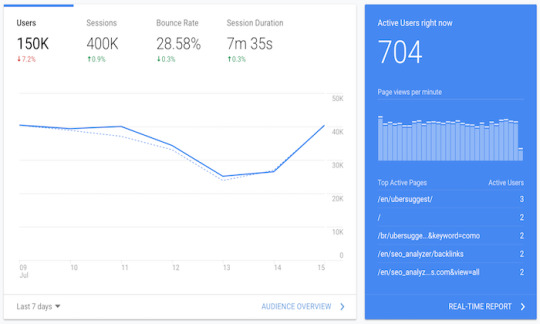
What percentage of your search traffic is driven by your top 10 pages?
Chances are, it’s a large portion.
Just look at the screenshot below. You’ll see that my top 10 pages drive 28.7% of my search traffic.

That may not seem like a high number, but I have 5,441 blog posts. In other words, 0.1% of my pages make up 28.7% of my search traffic.
Typically, with smaller sites, the percentages are much higher in which the top 10 pages make up the majority of their search traffic.
So, what does that tell you?
You should just focus on your top 10 pages and ignore the rest? Or, even worse, just focus on cranking out more new content?
Quality over quantity
I used to have the philosophy of “more is better.” I was cranking out dozens of articles each week. At one point, I was publishing 2 articles a day on this blog.
And, over time, my traffic grew, but not by much.
I was spending all of this time writing and realized that the majority of the content I was publishing never ranked.
So, what did I do?
I started focusing on my old, outdated content to boost my traffic.
Just think of it this way: Every week I publish one new piece of content, but my team, on average, is updating 23 older articles.
When I used to write more frequently, my top 10 pages made up 33% of my search traffic.

Since then, I have increased my search traffic by 107% and reduced my reliance on my top 10 pages by 13%.
So how did I do this? Well, as I mentioned, I have my team focus on updating my old, outdated content while I focus on creating new content.
Here’s exactly what I have my team implement, step by step.
Look for pages that were once loved
With Google Search Console, you have access to data for a much longer period of time. You can go back up to 16 months.
So, I want you to compare this month’s results during the same period as last year.
You can do this by clicking on “date” and then “compare.” Next, select your older date period first (should be roughly from a year ago) and then select today’s date period.

I’ve been doing this for a while, so I selected an older date range so you can see a better set of data before my team really focused on updating old content.
You should then see a report that looks something like this:

What you’ll want to do is look for articles that used to get a ton of traffic and have less now. From the screenshot above, you can see that my article on Instagram used to perform really well, but no so much anymore.
Keep in mind that I selected the older date range first. I did this to see which of my old pieces of content used to rank well so I can see if any of them have dropped over the last 12 months.
This will show you old content that Google used to love, but no longer does.
Now, let’s find content that Google never loved.
Look for pages Google never loved
Log back into Search Console and look for pages that have a high impression count but never got any real clicks.
The easiest way to find these pages is to set your date range to the last 28 days and look at each page’s metrics from an impression, click, and CTR perspective.
Sort the CTR column in ascending order (lowest percentage at the top, the highest percentage at the bottom).

Typically, the pages at the top of that list have the most potential. It means that Google is ranking you but you just aren’t getting too many clicks.
It usually isn’t just related to your title tag and meta description. It typically has to do with the content on the page.
Now it’s time to create a list of pages that have the greatest potential.
It’s time to prioritize
Typically, the pages that have the most potential are the ones that used to rank but no longer rank. Google used to rank and like them, which means if you give those pages a little tender loving care, you can easily get them loved by Google again.
The second group of pages that have potential, but not as much as the first, are the ones with a high impression count but an extremely low CTR.
These pages are harder to fix because they never really performed that well.
How to update your old content
Now that you have a list of pages to fix so you can boost your search engine rankings, I want you to log in to Google Search Console, find that article, click on it, and then click on “queries.”

For the keywords that don’t rank in the top 5 or have a high impression volume, I want you to go to your ranking article and see if the article is relevant for that term.
If not, adjust the article to at least include that term and cover that topic.
For the terms you already rank for in the top 5 spots, head over to Ubersuggest and type in those keywords and click on the keyword ideas report.
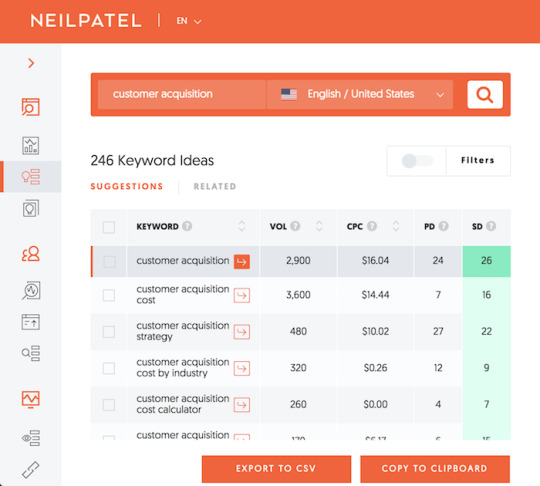
You’ll then see a report with all of the long-tail variations of that keyword.
If you adjust the article and include any of the long-tail phrases Ubersuggest gives you, you’ll see quick traffic gains.
In other words, if you already rank for the head term, it’s not hard to rank for the long-tail variation of it as well.
In addition to including the right keywords, you’ll want to update the post. Make sure all of the information is relevant, the pictures are up to date, and if you could include any multimedia (like embedding relevant YouTube videos) you’ll be able to increase the time on site of your visitors.
Finally, when updating your content, make sure your article is more thorough than all of the other sites that rank for the terms you are trying to rank for.
Remember that keyword ideas report I had you check out on Ubersuggest? On the right-hand side of that report, it shows you all of the sites that rank for that keyword.
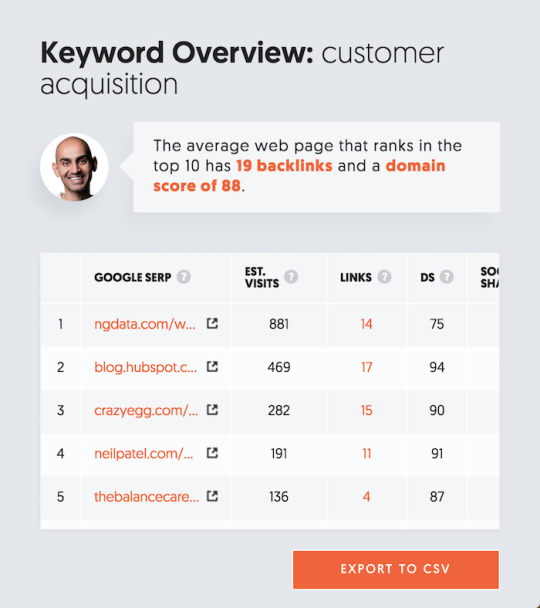
You can quickly see who’s currently ranking in each country, visit their web page, and make sure you create something better.
User metrics
User behavior is one of the biggest factors with Google’s algorithm.
Once you update your old content, you’ll want to optimize for user signals as that’ll help boost rankings.
A great example of user metrics is optimizing your title tags and meta description.
For example, if everyone searched a keyword on Google and clicked on the second result instead of the first, it tells Google that the second result is more relevant and that it should be ranking in the first spot instead of the second.
And Google eventually would make that change.
If you can use persuasive copy and convince people to click on your search listing instead of the competition, eventually your rankings will climb. And you can do so by following these 2 articles:
How to Craft Amazing Headlines
How to Write Copy like Apple
Over the years, I’ve done a lot of title tag and meta description tests and I’ve also found that these keywords help increase clicks:
What is
Best
Amazing
[lists]
How to
Free
You
Tips
Why
Tricks
Great
You can also use tools like Clickflow to A/B test your meta tags.
Don’t forget to promote (again)
Now that your content is up to date and you’ve optimized your meta tags for clicks, it’s time for you to promote your content.
I know what you are thinking… why would you promote old content, right?
Well, technically it isn’t old anymore.
First of all, you should update the published date or last updated date within your WordPress.

That way search engines know your content is changed, more relevant, and up to date.
Secondly, you need to promote the article. It’s new now, so why wouldn’t you share it with the world?
The simplest thing you can do is share it on the social web. I typically share my content on Facebook, Twitter, and LinkedIn… but you can pick whatever social profiles you have.
Although Google doesn’t really look at social signals, Bing does. Plus, some people who visit your page from the social web may decide to link to your article, which does help rankings.
And if you want to go above and beyond, check out Meet Edgar. It’s what I use to continually schedule my old content to be promoted on the social web. That way I don’t have to manually do it or set reminders.
In addition to social shares, you should consider sending out a text-based email blast to your audience promoting your content.
It’s a great way to get a quick boost of traffic and breathe life into your old content.
Here’s an example of a text-based email blast that I send so you can copy my format.
Subject: How to Generate 10K visitors from a Brand New Blog in Under 6 Months
If I tell you to do 100 things to grow your traffic, I know you won’t do it.
Heck, even I wouldn’t. It’s just too much work.
In the spirit of simplicity, just do this and you’ll get to 10,000 visitors.
I’ll even make a deal with you. If you follow it and don’t hit 10,000 visitors and you can show me you followed it, I will help you for free.
That’s how confident I am that it works.
Cheers,
Neil Patel

As you can see, simple text-based emails are generating 30% open rates and 6% click rates for me. Not too shabby.
You can also use tools like Subscribers to send out a push notification. Every time I update a post I send out a push. Look at my stats… I can easily generate an extra 7,000 visitors from a single push.

And don’t forget to build links
The last step you want to leverage is link building. You can use Backlinks to see who is linking to competing articles:
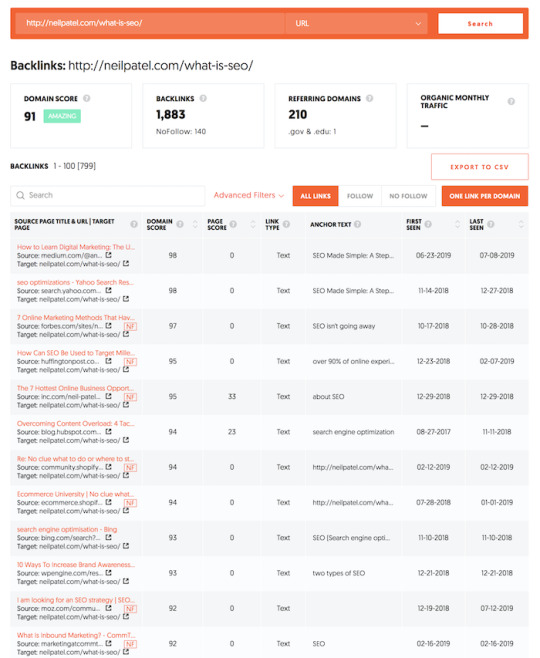
All you have to do is put in a competing URL and select “URL” from the drop-down menu and you’ll see every site that links to that page.
From there, you’ll want to reach out to each site and ask them to link to you.
The easiest way to do this is to leverage the skyscraper technique and the steps in this article.
Conclusion
Once you hit the 150 mark in the number of pages on your site, you should consider focusing the majority of your time to updating old content instead of creating new content.
If you have over 1,000 pages, you should definitely spend 80-plus percent of your time updating old content instead of writing new content.
The key to ranking your old, outdated content is to first focus on the content that used to rank but doesn’t anymore.
Once you fix those pages, you should see results within a month or two. From there, you can then focus on pages that have a high impression count but a low click count.
So, are you going to focus your time on ranking your old content or creating new content?
The post How to Rank Your Old, Outdated Content appeared first on Neil Patel.
How to Rank Your Old, Outdated Content Publicado primeiro em https://neilpatel.com
0 notes
Photo
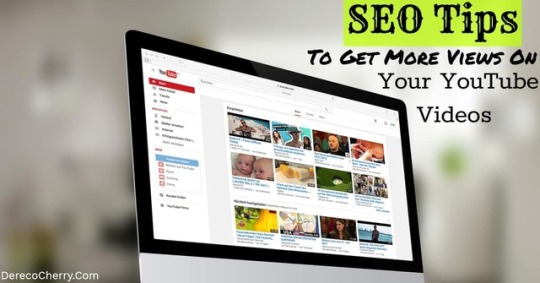
New Post has been published on http://simplemlmsponsoring.com/attraction-marketing-formula/mlm-sponsoring/4-seo-tips-for-youtube-videos-that-i-use-to-get-more-views/
4 SEO Tips For YouTube Videos That I Use To Get More Views
Do you want to get more views on your YouTube videos?
Here are 4 SEO tips that I use every time I record a video to get more views on it.
You want to make sure the videos you create can get in front of the right people when they search for them on the internet. I always follow these 4 steps every time I record a video. The first thing I do is make sure my video file name has the keyword in it. Next, you want your keyword somewhere in the title of your video. You want to add the appropriate tags to your video (make sure they are related) and you want a good description with your keyword and supporting tags sprinkled in there as well.
Why You Should Be Using YouTube
Well for starters, YouTube is the second largest search engine only behind Google. Google actually owns YouTube, so what this means is YouTube is built on searchable content unlike other social media networks like Facebook, Twitter, and Instagram.
When was the last time you got online and searched for something and an Instagram or a Facebook post showed up? Don’t get me wrong social media is a great way to build an online business and I highly suggest you learn how to properly use it.
But if you want that long term traffic and views to your videos, social media ain’t going to do it for you.
YouTube has people that are searching for answers no matter what business you are building. All you have to do is learn how to position your content to be found so when someone is searching for a particular answer your video shows up.
What Is The Meaning Of YouTube SEO
SEO stands for search engine optimization. It’s where you edit your video so it can be found for certain keywords. For example, you can SEO your video so when someone types in Lead Generation in Google your video shows up. That’s the basis.
The cool thing is when done right you can get that organic traffic (traffic you don’t pay for) to your videos pretty much every day. The higher your video ranks the more views you’ll get which can mean more sales and leads for your business.
To get those results from SEO will take some time and can be a little slow when you’re first starting. You could learn how to do paid ads for faster results but there can sometimes be a steep learning curve to paid traffic.
Why You Should Care About YouTube SEO
I’m all about creating leverage in my business and with video, they stay online forever and people can watch them any place in the world that has an internet connection.
I’ve been doing videos on YouTube for a few years now, and I still get leads and sales from videos I’ve created months and even years ago.
It’s like you do the work one time, and it keeps paying you over and over and over again.
I like to look back at some of the videos I did, in the beginning, to see how far I’ve come. You’d be surprised at the difference between your 1st video and your 30th video. With each video you do, you’ll see yourself getting better and better.
How Long Does It Take To See Results From SEO
If you find a very targeted keyword with little to no competition, you could rank as soon as you hit the publish button. I’ve found keywords like this before was able to rank instantly.
But for the most part, it will take a few weeks to know where your video will rank.
There are a ton of other factors that go into where a video will rank. Such as backlinks, watch time and social interaction.
Don’t worry about it if your video does not rank right away, instead focus on putting out consistent, quality content. You could do your SEO
What To Expect In The Beginning
I’m going to tell you up front, your first few videos are going to suck. There’s no getting around it. Everyone that is having success on YouTube had to go through it, I went through it, and to be honest sometimes I still do or at least that’s how I feel.
There is a light at the end of that tunnel though and you WILL get better the more videos you do.
How To Come Up With Content For Your Videos
Don’t over complicate this part as I did, just teach the day one version of yourself and take people along with you on your journey.
Here’s what I mean, let’s say you learned a new network marketing recruiting technique. You could turn around and create a video based off of what you just learned.
Don’t worry about if someone has already created the same topic as you have. The point is YOU haven’t created yet. You can have 5 people with the same topic and each person will deliver it differently.
Think of this like your teachers in school, you can have more than one math teacher teaching out the same book. Some kids will prefer one teacher over the other but they are still teaching out the same book.
Content creation is the same, just put it in your voice and put your spin on it and you’ll be just fine.
If you would like some help with creating your first video send me an email at [email protected] and I’d be glad to help you out.
What’s The Best Equipment To Shoot Videos?
Are you ready for this? It’s the smartphone you have in your pocket right now.
You don’t need any fancy equipment. If you don’t have a smartphone most laptops have built-in cameras that are good enough to shoot videos on.
And if you don’t have that you can go by a handheld video camera for just a few bucks.
Seriously you don’t need any fancy equipment at all, I shot my first video on a Blackberry smartphone! The quality sucked, I sucked, the whole thing sucked lol.
But I uploaded it anyway and hit that published button.
How To Create Great Videos Every Time
My first video I was nervous as hell, I can’t tell you how many times I told myself today was the day I was going to record that first video and it never happened.
I finally said screw it and recorded and uploaded it. Was it my best video? Of course not but the key is I got started.
And since doing that first video I’ve learned a lot along the way.
Including this full proof 4 step formula for creating videos that will virtually guarantee you make good content every time.
Intro – You want to introduce yourself and say where you are located. Question – Ask a question. Content – Answer the question you just asked. Make it good meaty content. CTA – At the end of your video give them a call to action. Tell them exactly what you want them to do next. YouTube SEO Tips For More Views Make sure you have your keyword in the file name of your video. Once you upload it to YouTube you can’t change it, so make sure you do that BEFORE you upload your content. Have a good title and try to have the keyword you’re going after in it. Don’t force it though. If it doesn’t sound right or sounds weird leave it out. Add the appropriate tags to your video. This helps youtube better understand what your video is about. Write a good description. You can have up to 300 words I think in the description. Fill it up. Also, sprinkle in some of those tags if you can. Again don’t force if it doesn’t make sense.
Make sure you check out the video on this blog post. I’ll be showing you step by step how to do this. I’ll also show you my secret tool that will save you a tremendous amount of time.
Ways You Can Make Money From Your Ranked Videos
Like I’ve mentioned before getting more eyeballs on your videos can lead to more sales for whatever business you’re promoting. Here are a couple of ways you can earn money from your videos. This by no means is a complete list as there are a ton of ways to do it. I’m just sharing some strategies that I’ve used.
Affiliate marketing is a great way to earn money from your videos. It’s super easy, you go out and find a product that you like. Preferably one that you’ve actually used or purchased, you promote it on your channel and you earn a piece of every sale that you make. Super simple, super effective and a great way to add an additional revenue stream.
Just about everyone starts off with affiliate marketing. One bit of advice about affiliate marketing, make sure it is congruent with your target audience. For example, if your YouTube channel is about dirt bikes, don’t recommend a product on how to lose weight.
Oh and I highly suggest you buy the product if possible. I know you might can’t do that everytime but when you can do it.
I personally try to only recommend courses, products or services I actually use myself.
You can sale your own product on your YouTube channel. The biggest difference between this and affiliate marketing is you get to keep all the money from the sale. You could have a physical or digital product.
What Is The Best YouTube SEO Tool To Use
Up until recently, I was using a few keyword tools to do my youtube research but I just learned keyword tools are pretty much useless and not very accurate at all.
While this post is not about keywords I will say this, if your idea about a video makes sense record the video. Just make sure you have a killer title. Now that I got that out the way the one tool I do use is called Tubebuddy.
This tool serves a couple of different functions. For starters, it has a tool called the keyword explorer where you can add the tags that are relevant to your video.
I’ll be honest up until just a few days ago I had no clue on how powerful the keyword explorer was.
It will tell you in real time where your video will rank for a keyword or tag. Pretty powerful stuff.
It has a checklist for you so you can make sure you’ve done things like added a description, and your thumbnail.
It also has canned responses that you can use to quickly reply to comments. Sometimes you can catch deals on it but I think the price is well worth it considering the time you can save in addition to the SEO benefits it offers.
Check it out if you want it’s not a must-have tool but it does help, very inexpensive, and saves you time. I personally use it every time I upload videos to my channel.
I’ll be doing a full review of TubeBuddy very soon, so make sure you subscribe here on my blog so you’ll get notified when I release it.
[Video] Here Is My YouTube SEO Tutorial
youtube
Conclusion
Let’s pull all of this together. Make sure you have a great title with the keyword in there if possible. If you can’t work the keyword in there that’s ok just make sure your title is good. Name your video file with the keyword you’re trying to target. Put the supporting tags on your video.
And the main thing is to make sure your content is helpful and answers a question or solves a problem.
These tips are for on-page SEO but keep in mind that you can do all of these and your video still won’t rank as there are other factors that go into that such as how long people your watch time and how much it is shared out.
If this youtube SEO tutorial has helped you out, let me know in the comments below.
Oh and feel free to share this around with anyone you think could get some benefit from this training. Thanks!
If this post was helpful, please do me a quick favor, like and share on Facebook or your favorite social media platform.
To Your Massive Success
Text or Call Me: (336) 782-8318 Skype: Reco.Cherry Email:[email protected] Need Some One On One Help? Check Out My Work With Me Page.
PS: My Buddy Just Released Some FREE Training With His Exact Strategy To Getting 225K Subscribers To His YouTube Channel All While Working Full-Time. Get Instant Access
Read more: derecocherry.com
0 notes
Text
9 Low Budget Content Marketing Ideas for Small Businesses
What do content marketing and a McDonald’s hamburger have in common? They’re both inexpensive!
Let’s get real, here.
You should not be spending huge amounts of money on creating content. But you should be creating huge amounts of content!
So how does this work?
Although it’s easy for big companies to spend large amounts on content marketing, you as a small business don’t have to! There are tons of low budget content marketing ideas out there, and we are going to share our favorites with you right now.
Content marketing is any type of content (blogs, photos, videos, posts, etc.) that you post online for your followers or potential customers to share, like or comment on. Believe it or not, content marketing is a driving force behind sales.
Why?
Because good content captures a customer’s attention while also making your brand memorable. It is a huge component in your marketing strategy that helps to build brand awareness and recognition.
So that the next time a potential customer needs to buy a product, your company is at the top of the list.
Building rapport with potential customers or cold leads can pose a challenge. These people have never heard of your company and do not know why they should choose your business over another.
Where do you even begin?
This is where our low budget content marketing ideas come into play!
Create A Blog
You may have been told to write blog posts for your business. But do you know all of the reasons blogging is beneficial to your brand?
This is essential and the only thing it will cost is your time.
Blogs can help answer questions like an in-depth FAQ section for your customers. They can also help to tell your brand story and share with customers what your company is passionate about.
Blogs are one of the best content marketing ideas where you can easily connect and engage with your audience.
If you use WordPress, Squarespace, Weebly, etc. it is super easy to create a blog section. If your site is in HTML it’s a little tricky, but sites like WordPress can easily be integrated. All you need to do is create a subdomain for your blog like yourbusiness.com/blog. Then it will be easy to house all of your blogs here and they won’t interfere with your website. It will also make posting them less of a headache.
Pro Tip: Write short blogs as well as long ones.
Entertain your site visitors by adding in photos or even video and graphic components to your blog posts. The point of a blog is to provide people with truly interesting content.
You want to make them stay on your website long enough for search engines to deem your site important and move you up in rankings. See…there actually is a method to the madness.
Whatever you write, make sure your blog is accessible and easy to find.
Link it on your home page and all other pages on your site. If you don’t do this people will have a difficult time finding your blog pages. And search engines won’t be able to rank these pages on your site.
Our blog is easily visible on the homepage and includes some of our top articles towards the top of the page. There are engaging titles that capture the attention of viewers and encourage them to click to read more.
If you want your blog content to be seen you need to have catchy topics or titles because the goal is to get people to click and spend time reading your content.
Social Media Posts
Many people associate social media with advertising. But you are probably already using social media channels to show off your content or link to your website or blog. Posting on social media at least once a week takes a small amount of time out of your week, but the benefits can be huge!
Social media posts are a great way to share content because you can combine them with our other content marketing ideas!
They do not have to be extravagant.
They can be as simple as sharing a blog post you have written or posting content that reflects your brands style or values.
Some examples of types of content that you can post include:
User generated content
Live streams
Infographics
Webinars
Client testimonials
Guides
How-To videos/articles
We’ll go more in depth with some of these content marketing ideas and how you can utilize them to grow your business! Once you create this content you can spread the word by posting on social media.
Pro Tip: Ask your followers for feedback on your content. Tell them to share their thoughts in the comments section. This is a sure way to gauge how you are doing with your content marketing ideas.
This is also a great way to get your followers engaging with you and each other. It allows you to build a community which in turn can increase your brand awareness and create lifelong customers.
If you want to grow your follower base and engagement rates quickly and efficiently, hire a social media marketing company to do it for you. You won’t have to worry about the content, publishing, SEO or any other parts of the content marketing process and can spend more time focusing on your business.
User Generated Content
This is quite possibly one of the cheapest content marketing ideas we have. User generated content is FREE and relatively effortless. All you have to do is repost or reblog. How can you encourage your followers to create content for you to repost?
Here are some ideas.
-Run a contest. People love contests where they can win something and did you know that giving away free stuff can actually make you money online?
-Straight up tell people you want to use their content. People love it when brands reply to them or use their photos! The first step here is to find a relevant photo or piece of content posted by one of your followers. Repost it and then tell other users that they could see their content reposted too! This will encourage people to start tagging your business in their posts.
-Ask people to post photos of their weekend or create a fun hashtag around a day of the week to get followers excited about sharing content.
If you can bring personality to your brand your followers will want to tag you in their social media posts and share their adventures with you.
This travel company uses their Instagram to promote content and photos that their users post. It’s easy for them because they are free to use this content as long as they give credit to the original content creator. And a lot of the time, your followers will create great content!
Just make sure that you sort out what is high quality versus low quality. You want to be sure your social media feeds are full of the best possible content.
Pro Tip: The only difficult part may be searching for quality content. But if you encourage users to use hashtags this will make your life much easier!
Client Testimonials
This is one of our content marketing ideas that you don’t need to put much effort in. Did you ever think clients could write your content for you? They can with client testimonials! Your only job is to encourage people to review your products or brand.
Don’t be shy when asking for reviews.
Customers know that reviews help you grow your business. And if they have had a good experience with your business they will likely be glad to leave you a review or testimonial that you can post on your website.
When potential customers are shopping for products online one of the deciding factors that they will look at is what other customers have to say about your product.
Yes there will inevitably be bad reviews. Not every business is perfect and you can’t please everyone.
When bad reviews to occur, make sure to handle them with care. Try to make the best of a bad situation. When potential customers see that you have fixed the problem, this will humanize your brand and speak volumes of it.
Need more tips about how to get good reviews online? Check out this blog!
Incorporate Video
You might be thinking that video is the most expensive of our content marketing ideas. Think again! It’s easy to put together a short video or interview that is beneficial to your customers. Videos allow your followers to consume information incredibly quickly without exerting too much energy.
This is especially important for millennial audiences and their need for instant gratification.
Here are some video ideas to get those creative juices flowing!
–Introduce yourself! Tell people what you business is all about. Having a face to put to a name is so important for your customers. Once they see that real people are behind a brand, they can better relate with your products or services.
–Show off new products. Yes you can show photos of your products but a video can show every angle as well as how to use your product. This is your chance to show people why they need your product in their lives.
–Having a sale? Make a video about it! With video you can use graphics and movement to create an interesting and engaging content.
With all of these great video ideas how are you going to go about shooting them on an incredibly low budget? Here’s a trick…
You can use Facebook live to broadcast to your followers for free!
They will see your video in real time and you can answer their questions, engage with them and more! Your followers will receive a notification when you go live so you won’t need to worry about having your viewers attention.
This is what your live broadcast will look like. You can see your video in real time as well as see comments and likes from your viewers. When you are finished recording your video you can save it to your Facebook page so new followers can see it in the future.
Webinars are also an easy way to utilize video as well as grow your customer base. Promote your webinar as a free class for people to get expert advice from you! Get people to sign up for your webinar so that you can build your email list and continue to provide webinar viewers with content. You don’t have to show your face if you don’t want to. Instead build a slide deck to show your viewers the content that you talking about. Similar to the one below that we did on Increasing Your Revenue Through SEO.
youtube
Email Marketing
Email marketing is a powerful tool that you can use to engage customers and increase your sales. Your emails should be diverse. Which means that not every email should be an attempt to sell your products or services. You should send out interesting, relevant content to your subscribers every so often.
If you focus solely on sales emails your open and click through rates will decline as your subscribers will become less interested in your content. This is why high quality content is so important. You want people to open your emails and then click through to your website.
Adobe sends their readers content like this to engage them and get them to click to their website!
This particular email is a compilation of several blogs that may be helpful or interesting to the Adobe community. They give subscribers snippets of their posts and encourage them to continue reading on their website.
Getting people to click through is important because it can impact your search engine rankings and higher rankings tell searchers that you are a credible source for information!
Utilize Hashtags
Hashtags increase your discoverability on social media and can help promote your content. Hashtag research is key when it comes to posting on social media.
You need to discover which hashtags are trending for your industry. You should also pick niche hashtags that are trending but not so popular that you post will get lost.
You can even make your own hashtag! This is a great idea if you are running a contest or building awareness for your brand.
Pro Tip: Don’t use just one hashtag. It isn’t enough to get your business discovered by a lot of people. But don’t overdo it by using 30 hashtags either. If you can find 10 relevant hashtags on each post this is probably a good number. It also depends on your business and who your customers are.
Big brands, like Coca-Cola for example, are already so popular that they don’t really need to use a bunch of hashtags to get discovered. Instead they can used branded hashtags like a slogan.
In this post they have used their own hashtag (#ShareACoke) with an incredibly popular hashtag (#ChristmasEve). If you were a smaller company you wouldn’t want to use just a popular hashtag and a company hashtag. Instead use a combination of well researched hashtags that connect with your target marketing in order to get your post noticed and gain new followers.
Go Behind The Scenes
People love to get a look at the inner workings of a business! This is your chance to show them things behind the scenes and what a day in the life of your company look s like.
Giving customers an exclusive inside look can help build trust. It’s fun content that you and your employees can create together to drive customer engagement.
So how can you do this? Use Instagram stories!
And if you end up creating some fire content, save them forever as an Instagram highlight!
Instagram stories are perfect for taking a risk and testing out new content ideas because they disappear after 24 hours and are saved in your archives. You can go back later and create an Instagram highlight out of your saved stories.
Stories can combine text, graphics, memes, video and more so they allow you to get creative! This is your chance to have fun!
Need some inspiration for these content marketing ideas?
You can use stories to…
Show people how to do something
Share how your product is made
Share insider tricks and tips
Interview your staff, CEO’s or owners
The possibilities are endless!
This donut shop has Instagram highlights about how some of their donuts are made. They show the whole process from start to finish about how they make the dough, fillings, and toppings as well as what ingredients they use and where they come from! Since they use all local ingredients this would probably convince some people to try out their donuts. In their highlight they also use humor and playful videos to engage customers.
Telling people something about your business is often effective. But showing them truly works wonders!
Produce Great Content
We saved the best for last in the since that #1 on our list of low budget content marketing ideas is simply to produce great content overall! High quality content engages customers, sparks conversation, and drives conversions.
Every piece of content that you post on social media or send in an email is a reflection of your brand or company. Which is a reflection on you as a business owner. You should want only the highest quality content to be pushed out to your followers, subscribers and customers. Any content that is less than stellar should either be edited or left behind.
Remember, quality over quantity!
We hope that you can utilize all of these content marketing ideas to help your business reach new heights! Have questions about content marketing? Let us know in the comments below or contact us directly here!
The post 9 Low Budget Content Marketing Ideas for Small Businesses appeared first on Digital Marketing Blog.
from Digital Marketing Blog https://ift.tt/319i7cm via IFTTT
0 notes
Text
With the Fashion industry being one of the biggest industries creating waste in the Planet, the look for thrift and vintage pieces have been on demand. I have been thrifting for some years now and there are mistakes that can be made very often but can be avoided.
1-Find your style. It’s very easy to be overwhelmed by all the options at a thrift store. So finding your personal style is key. I tend to look at the brand new items brands I enjoy (and that are my kind of vibe) are putting out, save the ones that catch my eye and then look at the bigger picture. By doing so, you can avoid buying items that don’t fit into your look, you can look at the materials that you like the most, the colours you lean the more towards and the types of cut as well.
2-Find your colour story. Now, this is what makes vintage/thrifting search much easier! Having a colour palette you stick with, will avoid you from buying items on shades or patterns you normally let just hang around on your closet. It also makes it easier to go through the racks as you will be just grabbing the colors that you truly want.
3-Get to know materials. Some materials can be priced really low and be high quality. A lot of the times, thrift store will overprice widely known brands and put a low price on an item that is made of silk for example. Always check the materials and see if they feel like they are worth the price tag.
4-Avoid buying something just because of the brand. So many times that I bought an item just because of the brand without thinking if it fit my style, my colour scheme, if the product had flaws or if the materials were worth the price. I look around the racks for products that catch my eye by colour, then by type, then by material and lastly will check what the tag says.
5-Look at racks that are above your size. Sizing has changed so much over the years, a vintage Medium might be a small today, therefore I always look at racks even past my size, some items also tend to be mislabelled, so it is worth a shot. So many items these days are meant to have a baggier fit and thrift shops are great to find them.
6-Always browse the men’s section. Men’s items for some reason tend to be lower in price (at thrift stores). The boyfriend fit it very in, so no better place to shop than the men’s section. I have found really good items by following this, including a full custom Hugo Boss suit and a Michael Kors belt that only cost 6$.
7-Shop for yourself. When reading thrifting articles online, we tend to read a lot about people that started their curated online stores. Everything seems very easy and that it is a fast turnover with money. This kind of business isn’t for everyone. Start by shopping things you really like, versus buying things thinking of re-selling, or remodeling, etc.
8-To thrift well you must have the time. Time is key. Thrifting is like searching for a treasure, unlike fast fashion where you have a whole rack with an array of sizing, thrifting does not provide you that. It takes time to look through all the racks, time to try it all on (I tend to fill up a cart and then try everything on the change room). Thrifting isn’t for someone who wants to have their shopping trip done in 10 minutes. If you lack the patience to do this, it might be best to search through curated vintage stores either in small boutiques or even online (etsy, instagram, etc).
All images used on the post are via pinterest and they are simply used to inspired vintage outfit searches.
8 tips to find the best thrift clothes With the Fashion industry being one of the biggest industries creating waste in the Planet, the look for thrift and vintage pieces have been on demand.
#best fashion advice#best fashion ideas#casual fashion#fashion ideas#fashion tips#low impact fashion#reusable fashion#slow fashion#thrift#thrift tips#trendy#trendy fashion#vintage clothes#vintage clothing#vintage flip#vintage haunt#vintage outfit#vintage search#vintage tips#vtg#vtg fashion#whowhatwear#www
0 notes
Text
Driving Traffic for Very Little Budget (Or Even Free!)
The internet sees about 200 thousand domains being registered daily. Not all websites are made equal. Some are just an online placeholder for businesses, while others are used to generate leads or get revenue from ads. But they all have one thing in common: websites need the traffic to serve the purpose they were designed for. And this is where the problems start.
While launching a website is relatively easy, driving traffic to it is rather challenging. We often see a trend where people start a website, invest a lot of time and effort trying to make it work, and then abandon the venue because they get no traffic. Imagine spending a few days crafting a blog post, which eventually got some 40 pageviews 10 of which are you checking how things have gone. Frustrating, isn’t it?
Competition makes it tough to get traffic naturally from Google. Time and patience may help, but you should have a truly stellar website so Google could notice you without extra effort on your side. The good news is Google is not the only potential source of the traffic to your website. Besides, optimizing your website to check every box on Google’s quality checklist is also a doable task. But first things first. Let’s see how visitors may come to your website.
Check out our complete and detailed free strategy on driving traffic with zero budget here.
A few words on traffic sources
Website traffic can come from various sources. Here we will briefly go over some of the most common channels for website traffic.
Search engines: Naturally, SERP or Search Engine Results Page links are on the top of the list. The most successful websites get most of their traffic from SERP as users searching for something online click their website link.
Social media: People share articles they liked on social media and their subscribers may also read those articles if they find them interesting. The best scenario here is the “pass-it-on” effect when new people share the post and even more users get a chance to read it. If an article goes viral, it can generate tons of free traffic.
Referrals: Other websites may link out to one of your pages. Direct referrals and indirect referrals like backlinks in content come under this category.
Ads: The fastest way to get a lot of traffic is by paying Google or another search engine for putting your post at the top of SERP’s page one. Paying Facebook or Instagram is another option.
Email marketing and other sources: You can invite the user to your website directly by using email marketing and other marketing methods.
Search engines and social media are what we call “free traffic sources”, but still, they are conditionally free. We still have to invest time in search and social promotion and to make our investments to pay off, we need to build up a strategy for this.
Since search overtakes social as the main traffic driver to websites, let me first share some SEO advice with you.
Jumpstart your SEO strategy
Remember me telling your quality blog post may start ranking in Google if you give it some time? The thing is since Google updated its algorithms, quality content rules. If it brings some unique value to the readers, Google will notice it and start ranking your page. All the search engines value content that answers users’ needs, so there’s no point to create texts stuffed with keywords. Or to write an instruction that is hard to read, no matter how relevant it is. Content should be relevant, yes, but also interesting, easy to comprehend and, when it’s appropriate, fun.
At the same time, simply writing some engaging text wouldn’t work. Users should be interested in the topic to start googling it, so make sure to collect keywords relevant to your business before and transform the topics into the content pieces.
You can do keyword research manually, but it will take you ages. Instead, you can use special SEO tools to speed things up. For example, SE Ranking is a toolset that can help you with all sorts of SEO tasks. Its SEO/PPC competitor research tool, for example, is great for collecting keywords for your website and it’s available for free under a 14-day trial.
Once you’ve published some comprehensive posts, make sure your website is error-free. A buggy slow-loading website is something both users and search engines hate. Run a website audit to see if you have any technical issues to fix. Also, pay attention to on-page optimization – this is how you help search engines associate your page with a certain keyword.
Being one of the biggest traffic sources, SEO doesn’t give instant results – you’ll have to wait for at least 2-3 months to get some decent rankings. To see the significant growth of traffic you’ll need to wait patiently for up to 9 months. SEO is a long-run game, but it is totally worth the time and effort you’ll have to invest.
Engage online to build links
Networking is an essential part of a successful marketing strategy. One way of building up the traffic is by interacting with users across popular online platforms.
Find threads related to your niche on forums and Quora, join Facebook groups. Actively interact with community members leaving relevant remarks and giving helpful answers to their questions. You can leave links to your website when appropriate, which people may use to visit your site. One thing that you must keep in mind is that your comments shouldn’t sound too promotional or otherwise, site moderators on websites like Quora can delete it.
Guest posting is another way to get leads and increase your website authority. Try reaching out to popular websites in your niche and ask them if you can write a guest post on their website. With interesting and intriguing topics, many websites will accept your guest post request.
A lifehack! You can start searching for the targeted blogs by googling the following combination: [“blog” + “write for us”]. In the first pair of quotation marks, you can specify a type of blog you are looking for: “food blog”, “fashion blog”, “travel blog”, etc. In the search results for this query, you’ll find the blogs that are open for guest posting in your niche.
You can also ask for comments from expert bloggers on a certain topic and include the quotes to your content. Don’t forget to tag the experts in your Facebook or Twitter posts citing your content – they might even repost it.
You should also engage with the visitor who comments on your blog posts. Make sure that you answer their queries and follow up on their requests.
Reach out to influencers
A way to get a quick boost to your website is by seeking the help of popular figures in your niche. With their help, you can connect with a wider spectrum of an audience in a very short amount of time.
Advertising from influencers is expensive, but some of them may work for free if your product is of particular value to their audience. At first, it is important to get mentions from people who have 500-1000 subscribers. If you know people followed by your target customers, invite them to try your product or service. There’s a chance that if they like your product, they will offer preferential terms for advertising or mentioning your business.
Instagram influencers are naturally also included.
Everyone that you reach out may not be eager to accept products or guest posts, and that how things are! All you need is to be persistent and keep trying with new influencers.
Leverage images and video content
Even if you have amazing content on your website, visitors may not be so inclined to read it if it looks like a large chunk of text. In 2019 and beyond, you need to be careful about how you structure your content.
Adding images and videos to your content is a good way to spruce it up. And the best part is that you don’t have to make videos specifically for your content. You can link a YouTube video for the user to better understand the topic but be sure to mention sources whenever you use something from another website to your own website. Once your website gets enough traffic, you can consider custom images and other media content.
Besides using media content for illustrating your articles, consider extra possibilities for sharing images and videos.
You can create infographics or explanatory images for different ideas you are trying to convey. And then share them on Pinterest
You should exploit YouTube as a traffic channel too! Create your channel and share video guides, backstage info about your product, organize free online webinars to attract new users. You’ll have to promote your videos using online communities that can be potentially interested in your topics.
Bottom line
Getting traffic to your site with no investment is not a far-fetched dream only big websites can achieve. Once you create something that provides real value to the user, Google will ensure you get proper visibility. However, in 2019 and beyond, you need to optimize your website so that your website becomes visible among the crowd and SEO is a way to do just that! With a bit of effort and patience, you can leverage SEO and start driving traffic to your website with 0 money. Well, yeah, almost.
The post Driving Traffic for Very Little Budget (Or Even Free!) appeared first on Full Scale SEO.
From https://www.fullscaleseo.com/marketing/driving-traffic-free/
from https://fullscaleseo2.wordpress.com/2019/11/11/driving-traffic-for-very-little-budget-or-even-free/
From https://affordableseoservices4.blogspot.com/2019/11/driving-traffic-for-very-little-budget.html
from https://affordableseoservices5.wordpress.com/2019/11/11/driving-traffic-for-very-little-budget-or-even-free/ from https://videomarketing6.blogspot.com/2019/11/driving-traffic-for-very-little-budget.html
0 notes
Text
Driving Traffic for Very Little Budget (Or Even Free!)
The internet sees about 200 thousand domains being registered daily. Not all websites are made equal. Some are just an online placeholder for businesses, while others are used to generate leads or get revenue from ads. But they all have one thing in common: websites need the traffic to serve the purpose they were designed for. And this is where the problems start.
While launching a website is relatively easy, driving traffic to it is rather challenging. We often see a trend where people start a website, invest a lot of time and effort trying to make it work, and then abandon the venue because they get no traffic. Imagine spending a few days crafting a blog post, which eventually got some 40 pageviews 10 of which are you checking how things have gone. Frustrating, isn’t it?
Competition makes it tough to get traffic naturally from Google. Time and patience may help, but you should have a truly stellar website so Google could notice you without extra effort on your side. The good news is Google is not the only potential source of the traffic to your website. Besides, optimizing your website to check every box on Google’s quality checklist is also a doable task. But first things first. Let’s see how visitors may come to your website.
Check out our complete and detailed free strategy on driving traffic with zero budget here.
A few words on traffic sources
Website traffic can come from various sources. Here we will briefly go over some of the most common channels for website traffic.
Search engines: Naturally, SERP or Search Engine Results Page links are on the top of the list. The most successful websites get most of their traffic from SERP as users searching for something online click their website link.
Social media: People share articles they liked on social media and their subscribers may also read those articles if they find them interesting. The best scenario here is the “pass-it-on” effect when new people share the post and even more users get a chance to read it. If an article goes viral, it can generate tons of free traffic.
Referrals: Other websites may link out to one of your pages. Direct referrals and indirect referrals like backlinks in content come under this category.
Ads: The fastest way to get a lot of traffic is by paying Google or another search engine for putting your post at the top of SERP’s page one. Paying Facebook or Instagram is another option.
Email marketing and other sources: You can invite the user to your website directly by using email marketing and other marketing methods.
Search engines and social media are what we call “free traffic sources”, but still, they are conditionally free. We still have to invest time in search and social promotion and to make our investments to pay off, we need to build up a strategy for this.
Since search overtakes social as the main traffic driver to websites, let me first share some SEO advice with you.
Jumpstart your SEO strategy
Remember me telling your quality blog post may start ranking in Google if you give it some time? The thing is since Google updated its algorithms, quality content rules. If it brings some unique value to the readers, Google will notice it and start ranking your page. All the search engines value content that answers users’ needs, so there’s no point to create texts stuffed with keywords. Or to write an instruction that is hard to read, no matter how relevant it is. Content should be relevant, yes, but also interesting, easy to comprehend and, when it’s appropriate, fun.
At the same time, simply writing some engaging text wouldn’t work. Users should be interested in the topic to start googling it, so make sure to collect keywords relevant to your business before and transform the topics into the content pieces.
You can do keyword research manually, but it will take you ages. Instead, you can use special SEO tools to speed things up. For example, SE Ranking is a toolset that can help you with all sorts of SEO tasks. Its SEO/PPC competitor research tool, for example, is great for collecting keywords for your website and it’s available for free under a 14-day trial.
Once you’ve published some comprehensive posts, make sure your website is error-free. A buggy slow-loading website is something both users and search engines hate. Run a website audit to see if you have any technical issues to fix. Also, pay attention to on-page optimization – this is how you help search engines associate your page with a certain keyword.
Being one of the biggest traffic sources, SEO doesn’t give instant results – you’ll have to wait for at least 2-3 months to get some decent rankings. To see the significant growth of traffic you’ll need to wait patiently for up to 9 months. SEO is a long-run game, but it is totally worth the time and effort you’ll have to invest.
Engage online to build links
Networking is an essential part of a successful marketing strategy. One way of building up the traffic is by interacting with users across popular online platforms.
Find threads related to your niche on forums and Quora, join Facebook groups. Actively interact with community members leaving relevant remarks and giving helpful answers to their questions. You can leave links to your website when appropriate, which people may use to visit your site. One thing that you must keep in mind is that your comments shouldn’t sound too promotional or otherwise, site moderators on websites like Quora can delete it.
Guest posting is another way to get leads and increase your website authority. Try reaching out to popular websites in your niche and ask them if you can write a guest post on their website. With interesting and intriguing topics, many websites will accept your guest post request.
A lifehack! You can start searching for the targeted blogs by googling the following combination: [“blog” + “write for us”]. In the first pair of quotation marks, you can specify a type of blog you are looking for: “food blog”, “fashion blog”, “travel blog”, etc. In the search results for this query, you’ll find the blogs that are open for guest posting in your niche.
You can also ask for comments from expert bloggers on a certain topic and include the quotes to your content. Don’t forget to tag the experts in your Facebook or Twitter posts citing your content – they might even repost it.
You should also engage with the visitor who comments on your blog posts. Make sure that you answer their queries and follow up on their requests.
Reach out to influencers
A way to get a quick boost to your website is by seeking the help of popular figures in your niche. With their help, you can connect with a wider spectrum of an audience in a very short amount of time.
Advertising from influencers is expensive, but some of them may work for free if your product is of particular value to their audience. At first, it is important to get mentions from people who have 500-1000 subscribers. If you know people followed by your target customers, invite them to try your product or service. There’s a chance that if they like your product, they will offer preferential terms for advertising or mentioning your business.
Instagram influencers are naturally also included.
Everyone that you reach out may not be eager to accept products or guest posts, and that how things are! All you need is to be persistent and keep trying with new influencers.
Leverage images and video content
Even if you have amazing content on your website, visitors may not be so inclined to read it if it looks like a large chunk of text. In 2019 and beyond, you need to be careful about how you structure your content.
Adding images and videos to your content is a good way to spruce it up. And the best part is that you don’t have to make videos specifically for your content. You can link a YouTube video for the user to better understand the topic but be sure to mention sources whenever you use something from another website to your own website. Once your website gets enough traffic, you can consider custom images and other media content.
Besides using media content for illustrating your articles, consider extra possibilities for sharing images and videos.
You can create infographics or explanatory images for different ideas you are trying to convey. And then share them on Pinterest
You should exploit YouTube as a traffic channel too! Create your channel and share video guides, backstage info about your product, organize free online webinars to attract new users. You’ll have to promote your videos using online communities that can be potentially interested in your topics.
Bottom line
Getting traffic to your site with no investment is not a far-fetched dream only big websites can achieve. Once you create something that provides real value to the user, Google will ensure you get proper visibility. However, in 2019 and beyond, you need to optimize your website so that your website becomes visible among the crowd and SEO is a way to do just that! With a bit of effort and patience, you can leverage SEO and start driving traffic to your website with 0 money. Well, yeah, almost.
The post Driving Traffic for Very Little Budget (Or Even Free!) appeared first on Full Scale SEO.
From https://www.fullscaleseo.com/marketing/driving-traffic-free/
from https://fullscaleseo2.wordpress.com/2019/11/11/driving-traffic-for-very-little-budget-or-even-free/ from https://affordableseoservices4.blogspot.com/2019/11/driving-traffic-for-very-little-budget.html
0 notes
Link
The internet sees about 200 thousand domains being registered daily. Not all websites are made equal. Some are just an online placeholder for businesses, while others are used to generate leads or get revenue from ads. But they all have one thing in common: websites need the traffic to serve the purpose they were designed for. And this is where the problems start.
While launching a website is relatively easy, driving traffic to it is rather challenging. We often see a trend where people start a website, invest a lot of time and effort trying to make it work, and then abandon the venue because they get no traffic. Imagine spending a few days crafting a blog post, which eventually got some 40 pageviews 10 of which are you checking how things have gone. Frustrating, isn’t it?
Competition makes it tough to get traffic naturally from Google. Time and patience may help, but you should have a truly stellar website so Google could notice you without extra effort on your side. The good news is Google is not the only potential source of the traffic to your website. Besides, optimizing your website to check every box on Google’s quality checklist is also a doable task. But first things first. Let’s see how visitors may come to your website.
Check out our complete and detailed free strategy on driving traffic with zero budget here.
A few words on traffic sources
Website traffic can come from various sources. Here we will briefly go over some of the most common channels for website traffic.
Search engines: Naturally, SERP or Search Engine Results Page links are on the top of the list. The most successful websites get most of their traffic from SERP as users searching for something online click their website link.
Social media: People share articles they liked on social media and their subscribers may also read those articles if they find them interesting. The best scenario here is the “pass-it-on” effect when new people share the post and even more users get a chance to read it. If an article goes viral, it can generate tons of free traffic.
Referrals: Other websites may link out to one of your pages. Direct referrals and indirect referrals like backlinks in content come under this category.
Ads: The fastest way to get a lot of traffic is by paying Google or another search engine for putting your post at the top of SERP’s page one. Paying Facebook or Instagram is another option.
Email marketing and other sources: You can invite the user to your website directly by using email marketing and other marketing methods.
Search engines and social media are what we call “free traffic sources”, but still, they are conditionally free. We still have to invest time in search and social promotion and to make our investments to pay off, we need to build up a strategy for this.
Since search overtakes social as the main traffic driver to websites, let me first share some SEO advice with you.
Jumpstart your SEO strategy
Remember me telling your quality blog post may start ranking in Google if you give it some time? The thing is since Google updated its algorithms, quality content rules. If it brings some unique value to the readers, Google will notice it and start ranking your page. All the search engines value content that answers users’ needs, so there’s no point to create texts stuffed with keywords. Or to write an instruction that is hard to read, no matter how relevant it is. Content should be relevant, yes, but also interesting, easy to comprehend and, when it’s appropriate, fun.
At the same time, simply writing some engaging text wouldn’t work. Users should be interested in the topic to start googling it, so make sure to collect keywords relevant to your business before and transform the topics into the content pieces.
You can do keyword research manually, but it will take you ages. Instead, you can use special SEO tools to speed things up. For example, SE Ranking is a toolset that can help you with all sorts of SEO tasks. Its SEO/PPC competitor research tool, for example, is great for collecting keywords for your website and it’s available for free under a 14-day trial.
Once you’ve published some comprehensive posts, make sure your website is error-free. A buggy slow-loading website is something both users and search engines hate. Run a website audit to see if you have any technical issues to fix. Also, pay attention to on-page optimization – this is how you help search engines associate your page with a certain keyword.
Being one of the biggest traffic sources, SEO doesn’t give instant results – you’ll have to wait for at least 2-3 months to get some decent rankings. To see the significant growth of traffic you’ll need to wait patiently for up to 9 months. SEO is a long-run game, but it is totally worth the time and effort you’ll have to invest.
Engage online to build links
Networking is an essential part of a successful marketing strategy. One way of building up the traffic is by interacting with users across popular online platforms.
Find threads related to your niche on forums and Quora, join Facebook groups. Actively interact with community members leaving relevant remarks and giving helpful answers to their questions. You can leave links to your website when appropriate, which people may use to visit your site. One thing that you must keep in mind is that your comments shouldn’t sound too promotional or otherwise, site moderators on websites like Quora can delete it.
Guest posting is another way to get leads and increase your website authority. Try reaching out to popular websites in your niche and ask them if you can write a guest post on their website. With interesting and intriguing topics, many websites will accept your guest post request.
A lifehack! You can start searching for the targeted blogs by googling the following combination: [“blog” + “write for us”]. In the first pair of quotation marks, you can specify a type of blog you are looking for: “food blog”, “fashion blog”, “travel blog”, etc. In the search results for this query, you’ll find the blogs that are open for guest posting in your niche.
You can also ask for comments from expert bloggers on a certain topic and include the quotes to your content. Don’t forget to tag the experts in your Facebook or Twitter posts citing your content – they might even repost it.
You should also engage with the visitor who comments on your blog posts. Make sure that you answer their queries and follow up on their requests.
Reach out to influencers
A way to get a quick boost to your website is by seeking the help of popular figures in your niche. With their help, you can connect with a wider spectrum of an audience in a very short amount of time.
Advertising from influencers is expensive, but some of them may work for free if your product is of particular value to their audience. At first, it is important to get mentions from people who have 500-1000 subscribers. If you know people followed by your target customers, invite them to try your product or service. There’s a chance that if they like your product, they will offer preferential terms for advertising or mentioning your business.
Instagram influencers are naturally also included.
Everyone that you reach out may not be eager to accept products or guest posts, and that how things are! All you need is to be persistent and keep trying with new influencers.
Leverage images and video content
Even if you have amazing content on your website, visitors may not be so inclined to read it if it looks like a large chunk of text. In 2019 and beyond, you need to be careful about how you structure your content.
Adding images and videos to your content is a good way to spruce it up. And the best part is that you don’t have to make videos specifically for your content. You can link a YouTube video for the user to better understand the topic but be sure to mention sources whenever you use something from another website to your own website. Once your website gets enough traffic, you can consider custom images and other media content.
Besides using media content for illustrating your articles, consider extra possibilities for sharing images and videos.
You can create infographics or explanatory images for different ideas you are trying to convey. And then share them on Pinterest
You should exploit YouTube as a traffic channel too! Create your channel and share video guides, backstage info about your product, organize free online webinars to attract new users. You’ll have to promote your videos using online communities that can be potentially interested in your topics.
Bottom line
Getting traffic to your site with no investment is not a far-fetched dream only big websites can achieve. Once you create something that provides real value to the user, Google will ensure you get proper visibility. However, in 2019 and beyond, you need to optimize your website so that your website becomes visible among the crowd and SEO is a way to do just that! With a bit of effort and patience, you can leverage SEO and start driving traffic to your website with 0 money. Well, yeah, almost.
The post Driving Traffic for Very Little Budget (Or Even Free!) appeared first on Full Scale SEO.
From https://www.fullscaleseo.com/marketing/driving-traffic-free/
from https://fullscaleseo2.wordpress.com/2019/11/11/driving-traffic-for-very-little-budget-or-even-free/ from https://smallbusinessseo3.blogspot.com/2019/11/driving-traffic-for-very-little-budget.html
0 notes
Text
How to use data to define your social media audience
Data. If you’re not sick of that word yet, then you’re not reading enough about marketing. Good data drives good campaigns and that goes double for marketing on social media.
So in this blog post we’d like to look specifically at how you can define your social media audience using data. Because knowing about who you’re speaking to is crucial. It allows you to engage with them better, grow your following, and (most importantly) better leverage your relationship to advance your business goals. As Maria Raybould at SEMrush puts it: “your content needs to be relevant for your existing (and not what-you-thought-it-would-be) audience.”
In this post:
How to define your social media personas.
Tools for analysing your social media audience.
How to grow your social media following.
Tips for leveraging your social audience.
Let’s get cracking then.
Wait, we’re talking about user personas right?
Absolutely. That’s something we should get straight from the start: the best thing you can do with what you learn about your social media audience is build user personas – aka customer or buyer personas. By defining your audience and recording that info in handy documents – complete with a name, mock profile picture and demographic info – you’re capturing highly useful IP. Persona docs will keep everyone involved in your campaigns on track and thinking about the right people in the right ways.
There are dozens of methods for building personas – you’ve likely done it yourself before – so we’ll keep our advice on creating social media persona docs brief. Basically, besides all the usual demographic details, we think you should work out:
What problems your personas have that you can solve.
What questions they have that you can answer.
How much they know about your company and its products or services.
What they’re looking for from your social media profile.
What platforms they use.
What action you want them to take, especially if this varies between your different personas.
View this post on Instagram
Trymyfab user personas finally created, designed, framed and ready to be hung in the office!! . . . . #entrepreneurlife #hustle #entrepreneur #hustlehard #curlygirl #naturalista #naturalhair #workworkwork #womenintech #womeninbusiness #blackgirlmagic #businesswomen #inspiration #teamnatural #userpersonas #uxdesign #customerdevelopment
A post shared by Christy Oyedeji (@gochristyo) on Sep 28, 2018 at 2:17pm PDT
How do you gather data for social media personas?
Your first port of call should be the native analytics provided by the social media platforms you use. LinkedIn, Pinterest, Snapchat, Facebook, Twitter and Instagram – they all offer highly useful insights of different kinds. We won’t go into details here – the internet is crammed with posts explaining exactly how to use each one (largely just for SEO purposes, IMHO) and frankly the world doesn’t need another post like that. Sensible people like yourself will get what they need by exploring the tools without any particular guidance, so the more relevant issue is knowing what to look for.
Your aim should be winkling out any trends, spikes or anomalies in the numbers. Some of these will be demographic, while others might be around a particular kind of problem or interest.
Example: You run a recipe website and notice that your Facebook audience has a lot of 18-24 year old followers, plus another demographic spike in the 55-64 age range. This probably represents two separate personas each with a different relevance to your business. One might be all about easy smoothie recipes delivered over mobile, for instance, while the other wants dinner party suggestions on their desktop. Meanwhile you notice that you also have lots of followers who like a page about Coeliacs disease. This user group is unlikely to cluster around a particular age range, but are all engaging with you for a very specific kind of content (namely, gluten-free recipes).
All of the these data-defined groups are a great starting point for personas. Create a file for “Coeliac Sally”, “Millennial Max” and “Baby-boomer Beth” and see if further research bears out your instinct that they each represent a distinct user type with specific needs.
View this post on Instagram
#glutenfreechallenge #20yearchallenge The first time I ate gluten-free bread, after my Coeliac Disease diagnosis, I thought I would never enjoy the taste of bread again. The only gluten-free “bread” available was rice cake. Can you imagine eating a cheese and ham sandwich with this “bread”? Yes, twenty years ago a #coeliac did not have too many options. It is amazing how the #glutenfree market has increased, giving many more gluten-free products to choose from. Twenty years ago, gluten-free foods were only sold in local bakeries, natural channels and speciality food shops. The products are now marketed and sold in mainstream retail stores. Restaurants have refreshed their menus to attract gluten-free customers; food manufacturers have created new products and retailers have increased shelve space, dedicated to gluten-free products. But we need to continue the progression, continue the education and awareness. I think we seemed to have mastered breads, cakes, pastas and pizzas. All very yummy, in their own right, but there is more staple foods and niche categories that need our gluten-free presence and better nutritional quality. So, hear my cry (or just read my words). Let’s make 2019 the year where we can end the confusion between coeliac and shellac. Yes friends, true story! A waiter thought I was asking to get my nails done in a pizza establishment. Let’s make 2019 the year we can go into any major supermarket and find gluten-free products that is not just limited to bread and little cake treats. And lastly, let’s make 2019 the year where asking for a gluten-free option is not seen as, being fussy or being on some new Hollywood diet and is respected as a serious, life treating, auto-immune disease.
A post shared by Maika Jiménez Blanco (@maikaenmicoche) on Feb 11, 2019 at 1:07pm PST
A side note about Twitter…
Having said that there’s no real need to explain the details of each of the different analytics tools, it is worth briefly pointing out the impressiveness of Twitter’s offering. By enabling Audience Insights you can get very granular detail on the particularities of your following – and even compare them against pre-made personas that Twitter pulls from its own data.
For example it turns out my personal Twitter is 60 per cent women from Auckland who like dogs and science, and they engage with book content 65 per cent more than the average millennial. That’s the kind of insight that’s immeasurably helpful in crafting content (maybe a review of a science-y book about dogs would be a good post?) so it’s just a shame that Twitter use in Australia and New Zealand is so modest.
Get data insights from your ad platforms
Another source of data on your social audience that you shouldn’t overlook are the various social advertising platforms. These each provide insights into how your campaigns performed – and the information can be valuable in different ways. So for example if you use Facebook Pages Manager, and navigate to Insights and then People, you’ll get good demographic data on the people who currently follow you. But if you run an ad campaign, then check the results in Facebook Ads Manager, you’ll get insights on how people who don’t follow you interact with your content.
Similarly, if you’ve targeted an ad at a particular audience, then you’ll start to get deep insights from the results. Thinking back to our recipe website example, if you targeted ads at the “Coeliac Sallys” you might learn that they don’t engage with special offers on Facebook, but they do like to read about gluten-free product reviews. Make sure you capture that kind of information in your persona files.
Use 3rd party tools to analyse social media audiences
By giving access to their APIs social media platforms let third party companies crunch their data and repackage it into products for marketers. This has given rise to what’s known as ‘social listening’ or ‘social monitoring’, which often involves specialist tools. The best of these can combine data from multiple platforms and schedule your posts over different accounts while also allowing you to monitor the social media activity of your competitors, spot the most successful hashtags, and see who is likely to be paying for amplification and who is going it organic.
Tools that are worth checking out include:
RivalIQ, which also creates handy live benchmarking for different industries. So for instance you can see that the airline sector posts to social on average 14.6 times per week across all channels, compared to the environmental sector which averages 83.5 posts per week!
SEMrush, which will also break down the most successful content by type, be it video, photo or link.
SocialBakers, which claims to be an AI-powered tool that will create social persona for you – and can find the influencers that your personas engage with.
SproutSocial, another all-in-one tool. Its pricing starts at $100 per month.
HootSuite, which boasts access to 35 social media platforms, and an ecosystem of more than 250 partner apps.
BuzzSumo, another best-in-breed tool. We love the simple interface that lets you plug in any URL, domain name or topic to instantly see what content gets shared, how much, where, and by whom.
How to reach new audiences using social media data
With your social media personas created you’ll now be in a far better position to create content over time that resonates with both your current audience and those you’re yet to reach. But we ought to also mention the possibility of reaching whole new audiences en masse using remarketing tags and/or lookalike audiences.
In marketing parlance pixels are pieces of code – also known as remarketing tags – that track people who have visited your site so that they can be targeted later, on a different platform. So in our recipe website example, if you had the (free) Facebook Pixel installed on your site, you could create a custom audience of every person with a Facebook account who had visited, say, the Smoothies section of your site. You would then be able to serve an ad to exactly those people, which would be much more likely to get high conversion – especially if the creative was informed by what you know about this type of person from your social personas.
More intriguingly, if that custom audience has enough people in it to extract meaningful data, Facebook can also create a lookalike audience of the same kind of people – people who haven’t visited your site, but are a match for those who have. Armed with this kind of data-designed custom lookalike audience you have the potential to reach a huge number of the right kind of people for your business.
from http://bit.ly/2GmzPkT
0 notes
Text
These 10 #Travel and #Tech Products are a must have for your Holidays 2018 Wish List! #CTATravel
Disclosure: This is an event recap. This post is NOT compensated.
I am woefully behind on Event Recaps thanks to a summer that brought a devastating fire on the Fourth of July due to someone sneaking up to the roof of my apartment building and throwing illegal fireworks, followed by a death in the family a week later, and culminating in me twisting BOTH my ankles and spraining my wrist a week after that!
To say it has been a "challenging' summer would be a complete understatement.
All the events I did get to attend before my world came crashing down were pretty amazing, and while it may take me awhile I promise I will get to each and every one of them.
I had the chance to attend the Techlicious/Consumer Technology Association/CES Lunch and Learn event at Quality Italian Restaurant in Midtown New York City.
I will start with the hot tech first and then lead into the great food!
These are the great products I was exposed to (these are NOT reviews, I got to see the products at the event, not road test them personally, so these are first impressions)
Since the nice reps from Roku were seated at my table, I will start with Roku first:
Roku Streaming Stick
I am totally getting sick of dealing with my Cable Company, and with features like Hotel and Dorm Connect the Roku Streaming Stick is perfect for both Travelers as well as College Kids hitting the dorm. Why pay the hotel a million bucks to rent a movie when you can just bring along your own streaming stick? Retail Price = $49.99 - these were in our gift bags but I didn't get a chance to test mine as it was lost in the fire, if Roku sends out a replacement I will definitely provide you guys with a full review.
The next brand has been at several events I regularly cover including The Luxury Review/The Luxury Tech Show and I haven't had a chance to take the demo or speak to the reps (in this instance it was my arrival time, at LTS my time at certain booths ran overtime during the Press Preview time period and once that event opened up to non-press it was just too crowded to get in there.) But I have wanted to take the demo and will have to make sure to do it next time I see HTC Vive.
HTC Vive
I love that Virtual Reality is being used by the travel/hospitality industry to help you tour a destination or a hotel room without ever leaving the comfort of your couch. Retail Price = $1,399 (definitely a splurge but Vive Pro definitely has one of the richest content libraries available on SteamVR and VIVEPORT.
Ashley Chloe Helix Cuff
You guys know I am called #TheOfficialTwitterPartyDJ via Twitter because I am a Twitter Party Hostess with the Mostest who LOVES Music and hasn't met the twitter party yet I couldn't find the right song for. I am always on the market for new audio and when I can combine my love of audio and tech with my love of fashion and accessories all the better! My Audio 'Form Meets Function' pick from the event is definitely The Ashley Chloe Helix Cuff. The world's first wearable wireless Bluetooth headphones with cVC noise reduction, AptX Technology, Smart Multipoint Connectivity and Bluetooth 4.1. Retail Price = $99.00 - $249.99 (The pricier one is the Helix 24K Gold Edition, love the exclusive color! I would have to listen to Bruno Mars 24K first on these!) Earbuds not getting twisted or destroyed in my cavernous handbag, PRICELESS!
myCharge Pride Limited Edition Power Bank
myCharge Pride Limited Edition Power Bank was donating 5% of Pride Month Power Bank Sales to The Trevor Project, and since later on this year I got to cross attending Ru Paul's Drag Con off my bucket list (full post to come) - this got me a thumbs up every time I pulled it out to keep my phone charged during the conference. This is a little bulkier than some of the Power Bank's I have used in the past, but love the on and off button, how fast it charges my devices and how long it holds its own charge. The plug for the wall flips out, and this charges itself AND the device simultaneously. This one definitely gets a thumbs up from me, and something like this can cross off nearly everyone on your list! Retails for $34.99
Hum by Verizon
With holiday travel at it's peak and everyone driving to visit family and friends, the Hum by Verizon certainly helps prove that 'those who wander are not lost'. With pinpoint roadside assistance, you can get the help you need by using the Hum App to request 24/7 roadside assistance, there is also a mechanics hotline, stolen vehicle assistance, maintenance reminders, you can check your safety score (this helps keeps insurance costs low), vehicle diagnostics and you can also turn your car into a Wi-Fi Hotspot allowing passengers to stream, surf and game on the road (eliminating the dreaded "Are We There Yet?" Questions, PRICELESS).
Sony WH-1000X M3 Wireless Headphones
The Sony WH-1000X M3 are pricey at $349.99, but these wireless, noise cancelling beauties offer five hours playback from a mere 10 minute charge, perfect for us frequent fliers who struggle to find an outlet or left our trusty powerbank behind. We were shown the M2's but the M3's are already out now. I need these in my life and am sad they were not in the gift bag!
Sony SP700N true wireless earphones
With extra bass and the Google Assistant built into these Sony SP700N true wireless earphones, you can make easy hands free at the click of a button, enjoy digital noise cancellation or ambient sound which lets you hear essential sounds. The compact carrying case not only keeps them secure, but holds an additional two full three hour charges, so you can power them on the go! These sound perfect for my morning commute, and I am bummed that these weren't in the gift bag either. These Retail for $149.99.
Sony RX100 Advanced Camera
Sony was showing their RX100 Advanced Camera with 1.0 Sensor, while it may be portable, the specs are definitely not 'lightweight'. It is a 20.2 MP, with a SteadyShot that reduces blur even in low light, HD video capabiity for beautiful video and full manual control for creative photography. It retails for $369.99. Not in the gift bag either, le sigh. I have had my eye on the Sony a7rIII which I played with last year during Fashion Week at Sony Square Space in NYC and then again at this year's Photo Plus Expo. I took a picture with it that served as a Best Buy contest entry during the Expo which is featured on my Instagram page here: https://www.instagram.com/p/BpbS1-TAXLt/ - I have to say I am bit more inclined to the A7RIII, but this has a $2,799 retail price tag making the RX100 a bit more holiday budget friendly. But as Photography is a huge part of my career, not just a hobby/passion, I am telling Santa I want the A7RIII (42.4 MP with 14-bit RAW output!) for Christmas! I really have been a very, very, very, good butterfly this year.
Speck Presidio for iPhone X
Speck Presidio for iPhone X offers 8 foot drop protection! While I am an Android girl and have never owned an iPhone, I have witnessed a ton of friends, family and colleagues drop their uber expensive phone and ended up walking around with a cracked screen - not cute. Why not make a small investment in protecting it instead? At $39.95 ($27.96 if you act fast to nab the extended Cyber Week deal) it gives you something absolutely PRICELESS - peace of mind!
Modobag - Motorized Luggage
See that image above? That is a grown man riding on Modobag - Motorized Luggage, it convinced me to give it a go:
Actually I watched TWO men ride this thing before I opted to get on it myself.
Zip through the airport terminals and never miss a flight, on a single charge the Modobag has the ability to travel up to 6+ miles based on a rider weight of 180 pounds, it has an indoor speed of 4 MPH, and outdoor speed of 7 MPH, three times a regular walking pace, and it goes to full charge in two hours. It also has two USB ports for individual or simultaneous charging. I totally want this for Christmas, as a Blogger this would be my portable office for press trips! I really want this! The Retail on Modobag is $1,495 - which considering designer luggage costs three times as much, and does not haul you around in addition to your stuff, this is actually a steal! I also wanted to share some photos of our meal:
CTA Travel Tech Lunch Menu
Above: CTA Travel Tech Lunch Menu
Shrimp Cocktail Appetizer
Above: Shrimp Cocktail Appetizer (shared by our table, I swear I didn't all that!)
Baby Kale Tricolore Salad
Above: Baby Kale Tricolore Salad
Sausage and Pepper Garlic Toast
Above: Sausage and Pepper Garlic Toast
Mediterranean Branzino, Pesto Rosso with Qi Tuscan Fries
Above: Mediterranean Branzino, Pesto Rosso with Qi Tuscan Fries (you know I usually go for the seafood/fish dish!
Above: Sometimes I am not fast enough to nab a shot before hungry Editors tear into something, but I oddly like this shot all the more for having some pieces missing!
Chocolate Coffee Malt Cannoli with Pistachio Gelato
Above: Chocolate Coffee Malt Cannoli with Pistachio Gelato
QI Signature Lemon Meringue Tart
Above: QI Signature Lemon Meringue Tart MY TAKE: These items are perfect for anyone on your list, and are going to score major brownie points with travel lovers and tech enthusiasts of any age. Again these are impressions as I got to play with these products at the event. Should I get review units I will give those items their own day in the sun with full reviews.
My photos are watermarked, un-watermarked photos were used by media with permission. This is the second year I have attended this event, (the food is always amazing) just in case you missed last year's which focused heavily on Photography and Photography tips for getting better shots, check it out here: https://www.ascendingbutterfly.com/2017/10/techlicious-ctatech-ctaphotonyc-lunch.html This by far has been the second worse year of my life, second only to almost dying in 2011. It zapped every ounce of writing energy out of me. Not to mention left me without a computer until Black Friday Sales enabled me to get a laptop. I am just not one of those bloggers who can blog solely via phone. I do not have millenial thumbs and have no idea how they can get so much typing done on a mobile touch keypad. I am slowly but surely trying to get myself ramped up again. And am considering either a re-design or a complete re-branding. I do have some overdue giveaways so check back often. For those of you who have sent me personal emails checking in on me, Thank You! I know our Inspirational Messages of the Day and Gratitude Sundays have been missed, and I will find a way to bring them back soon. Let's just say getting myself motivated has been difficult enough lately. This event put some great products on my radar, I definitely wouldn't mind seeing any or all of these under my Christmas Tree or stuffed inside my stocking this year. Readers: Which of these do you want most? Do you already have any of them?
·٠•●♥ Ƹ̵̡Ӝ̵̨̄Ʒ ♥●•●•٠·˙˙·٠•●♥ Ƹ̵̡Ӝ̵̨̄Ʒ ♥●•●•٠·˙˙·٠•●♥ Ƹ̵̡Ӝ̵̨̄Ʒ ♥●•●•٠·˙
FTC Disclosure: No monetary compensation has been received, and all opinions are 100% my own! I am disclosing this in accordance with the Federal Trade Commission 16 CFR, Part 255 - Guides Concerning the use of endorsements and testimonials in advertising, you may check our Giveaway and Disclosure Page for additional information regarding Ascending Butterfly Disclosure.
These 10 #Travel and #Tech Products are a must have for your Holidays 2018 Wish List! #CTATravel published first on https://vsguides.tumblr.com/
0 notes